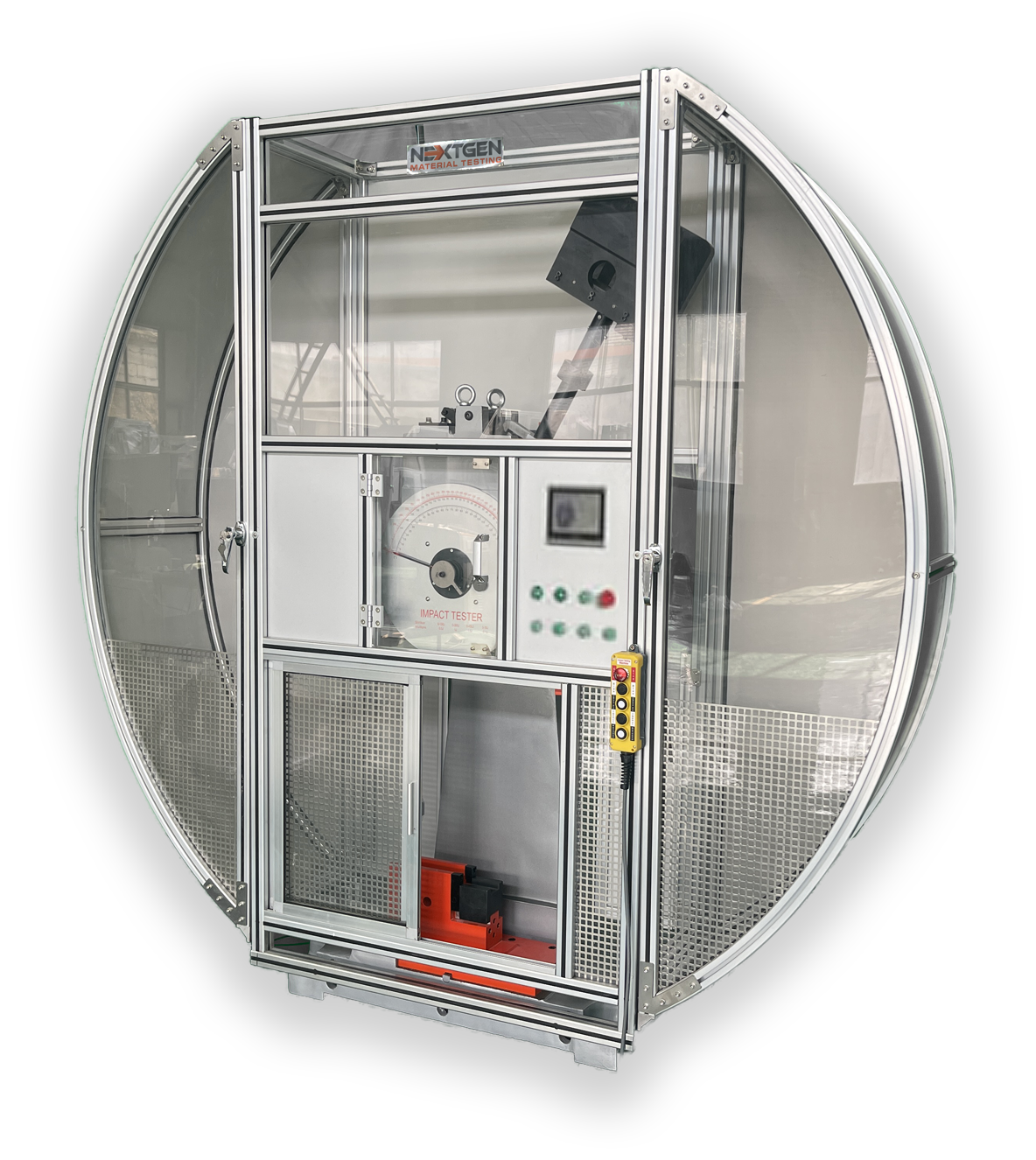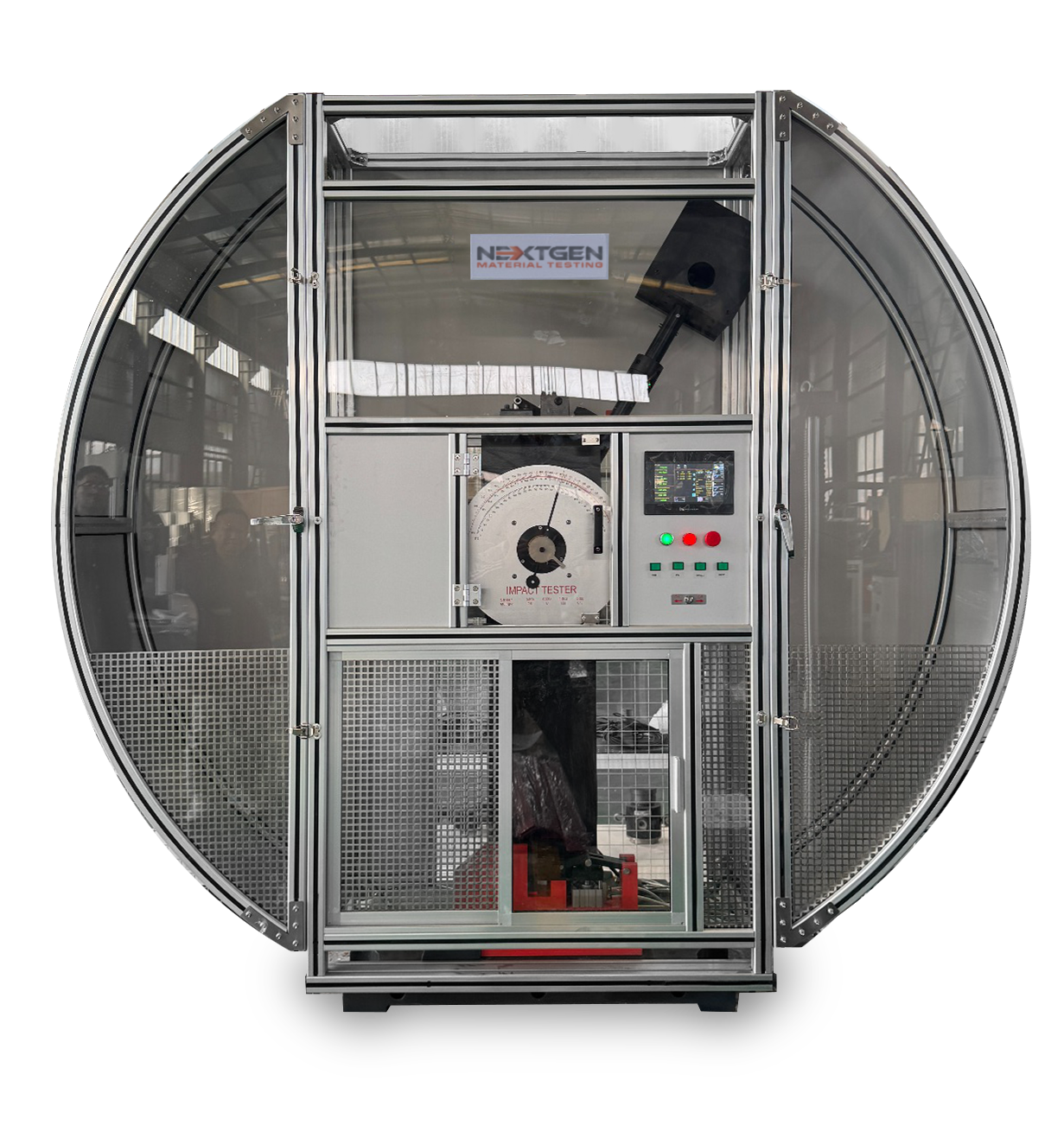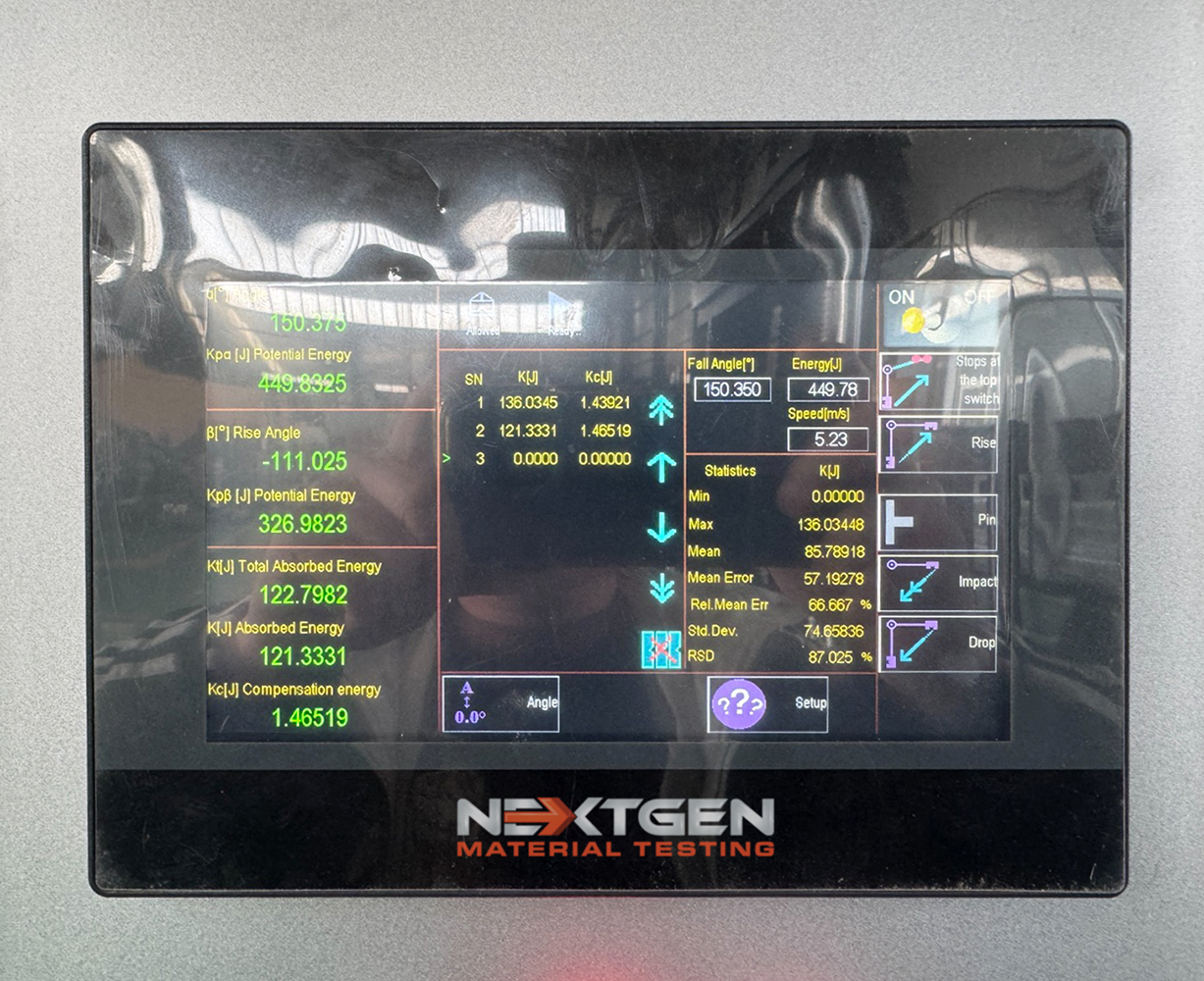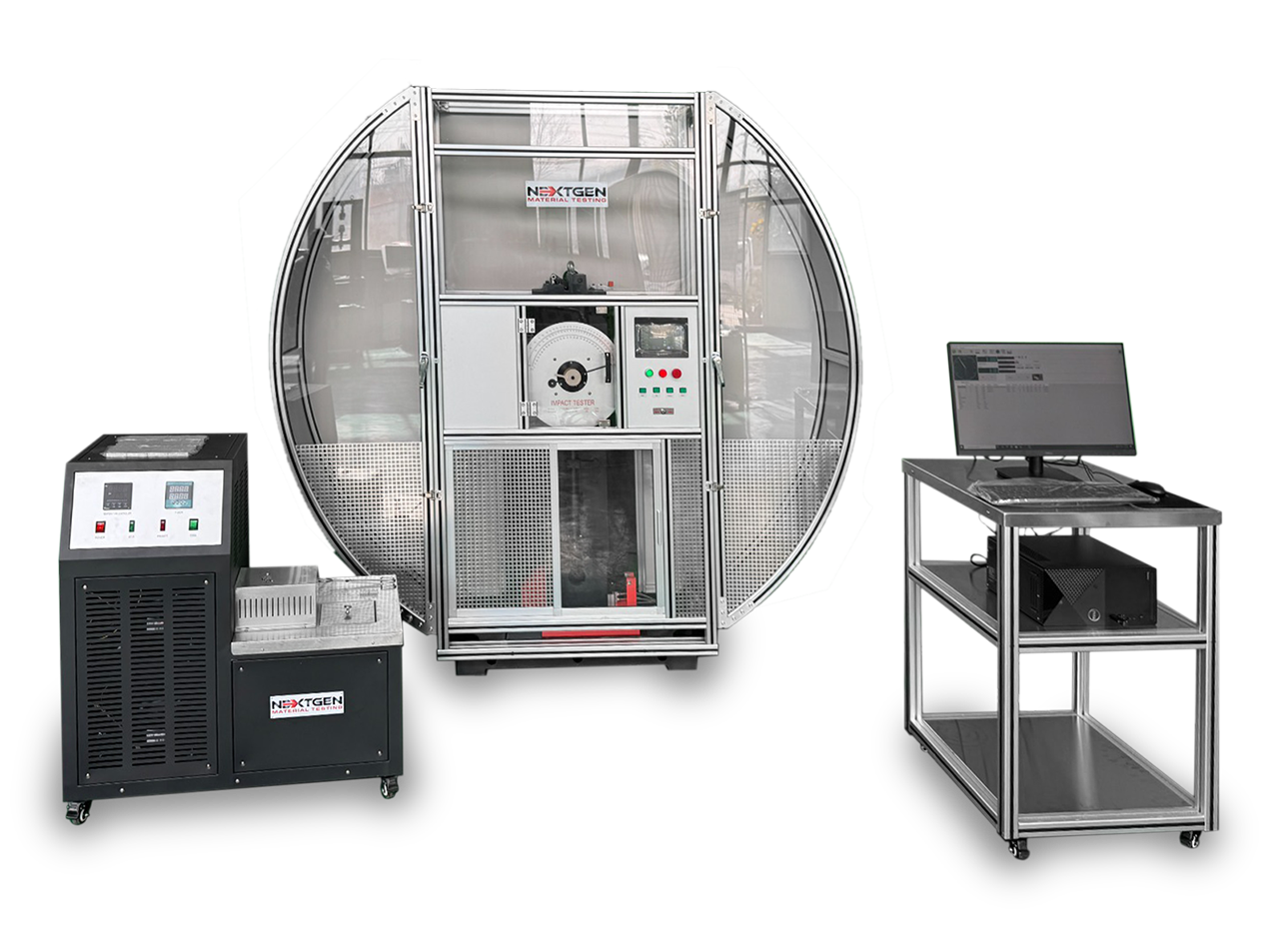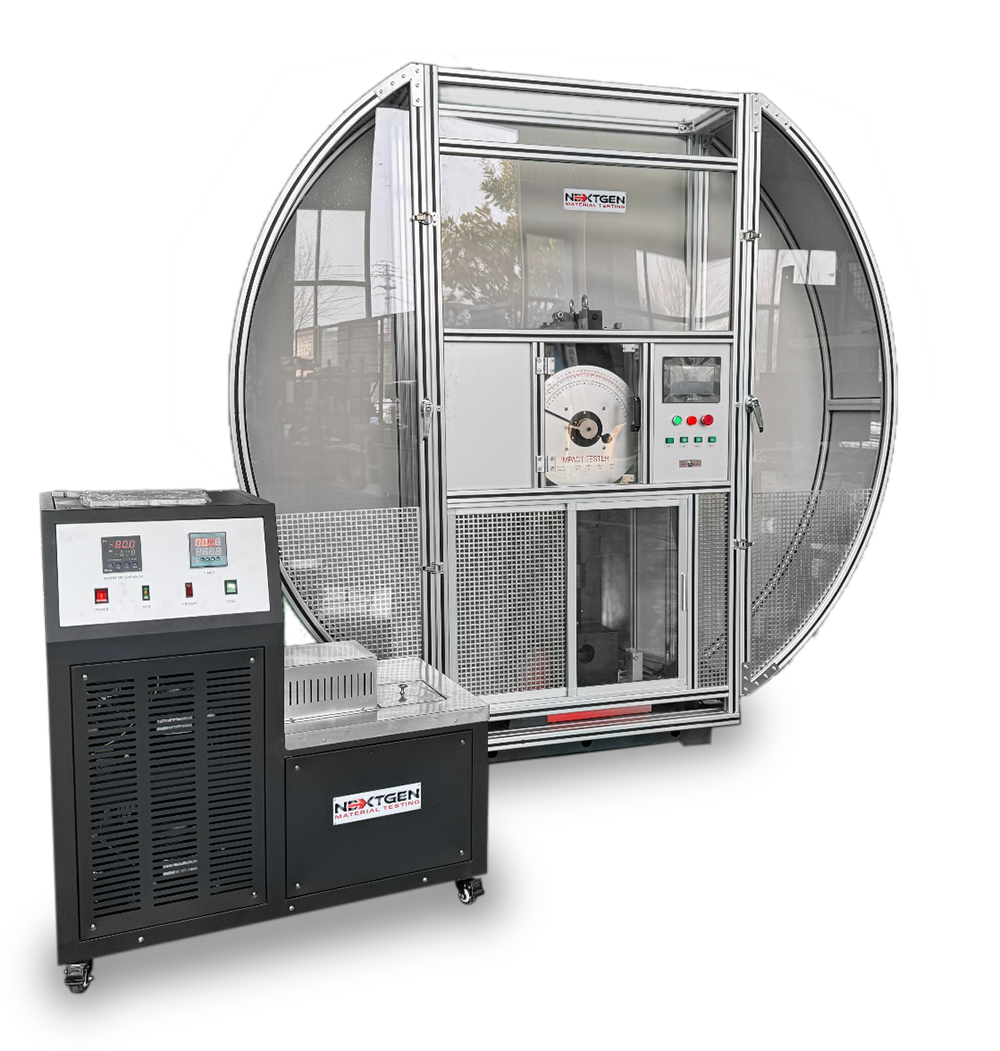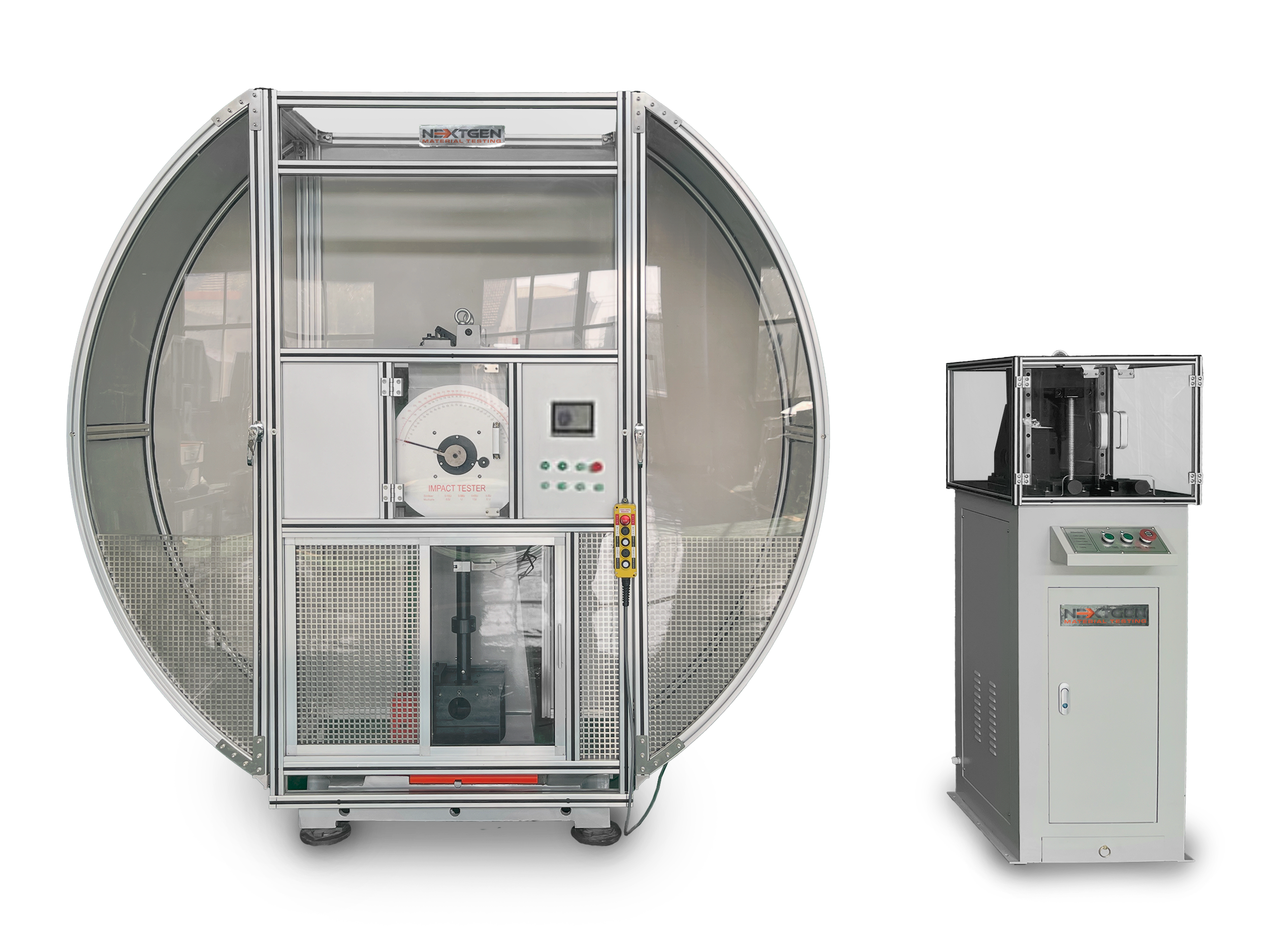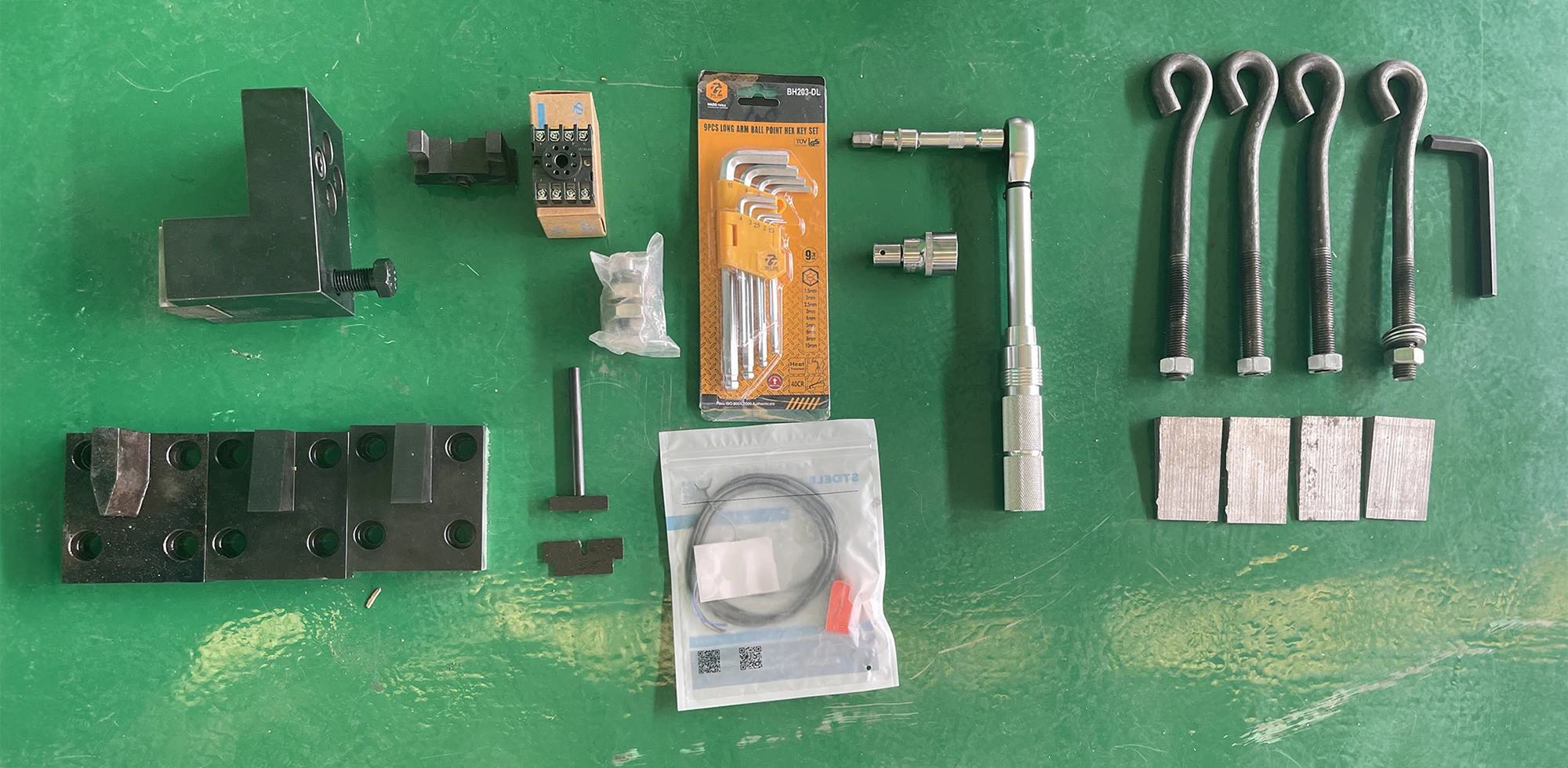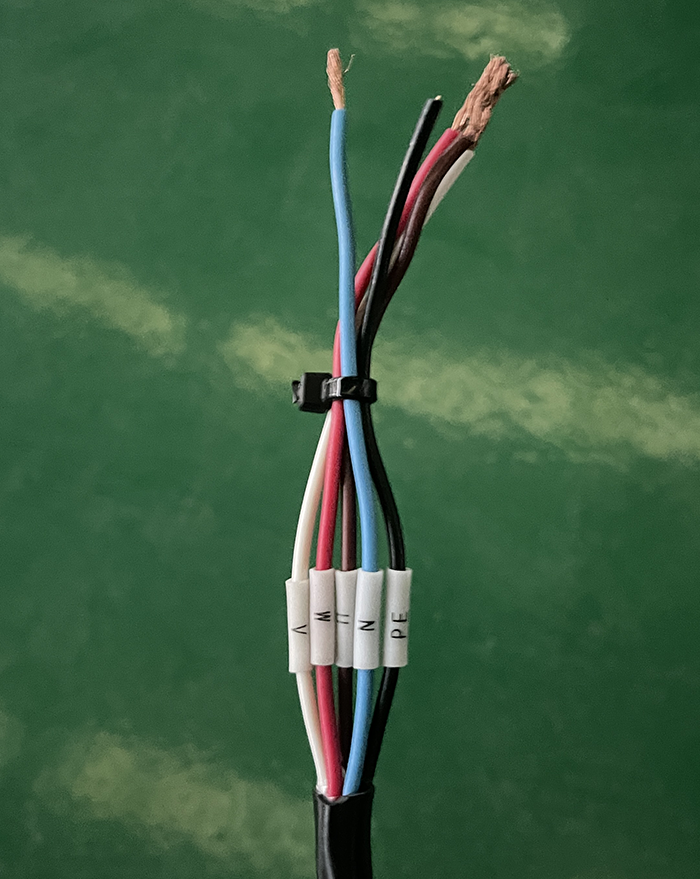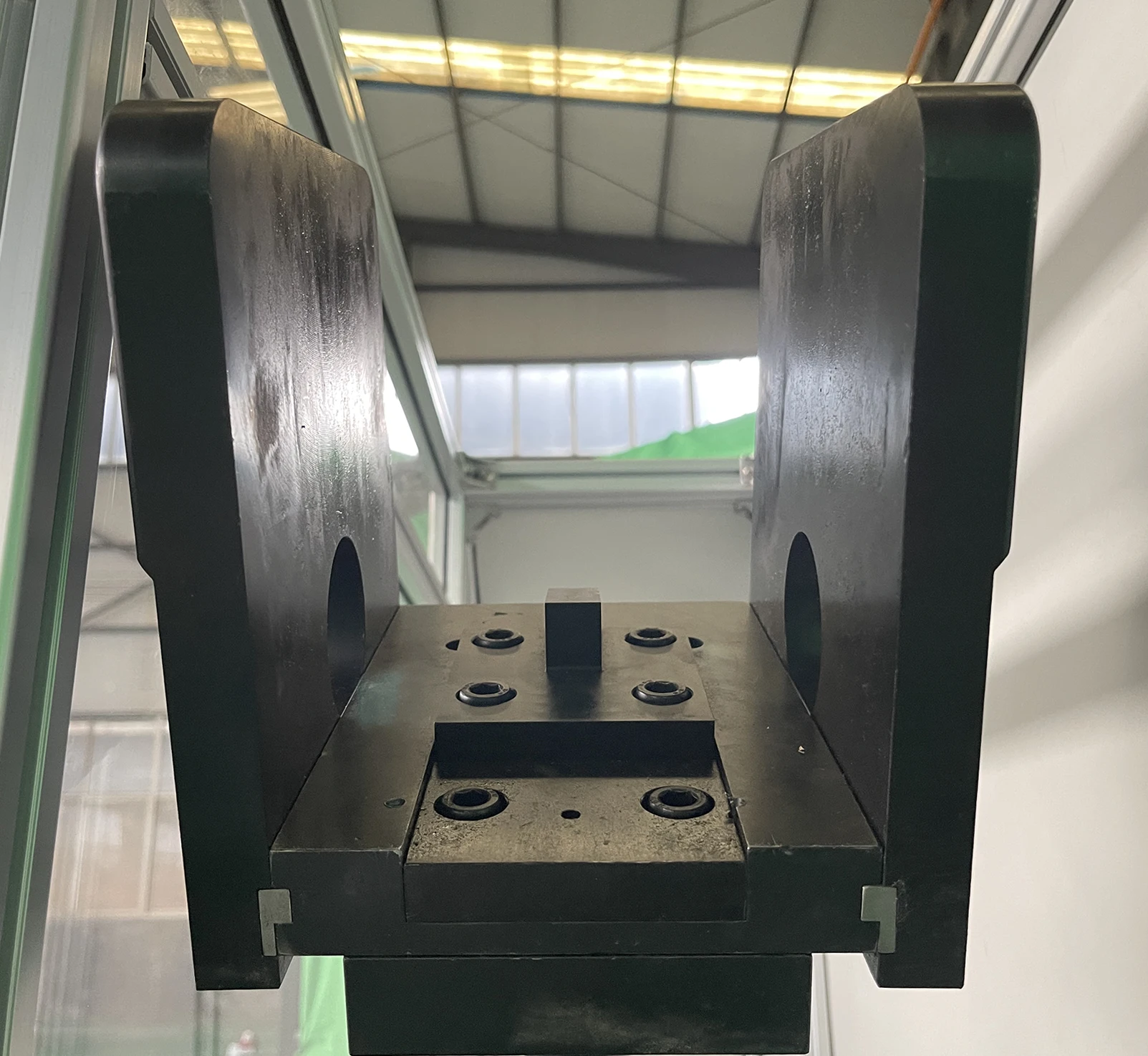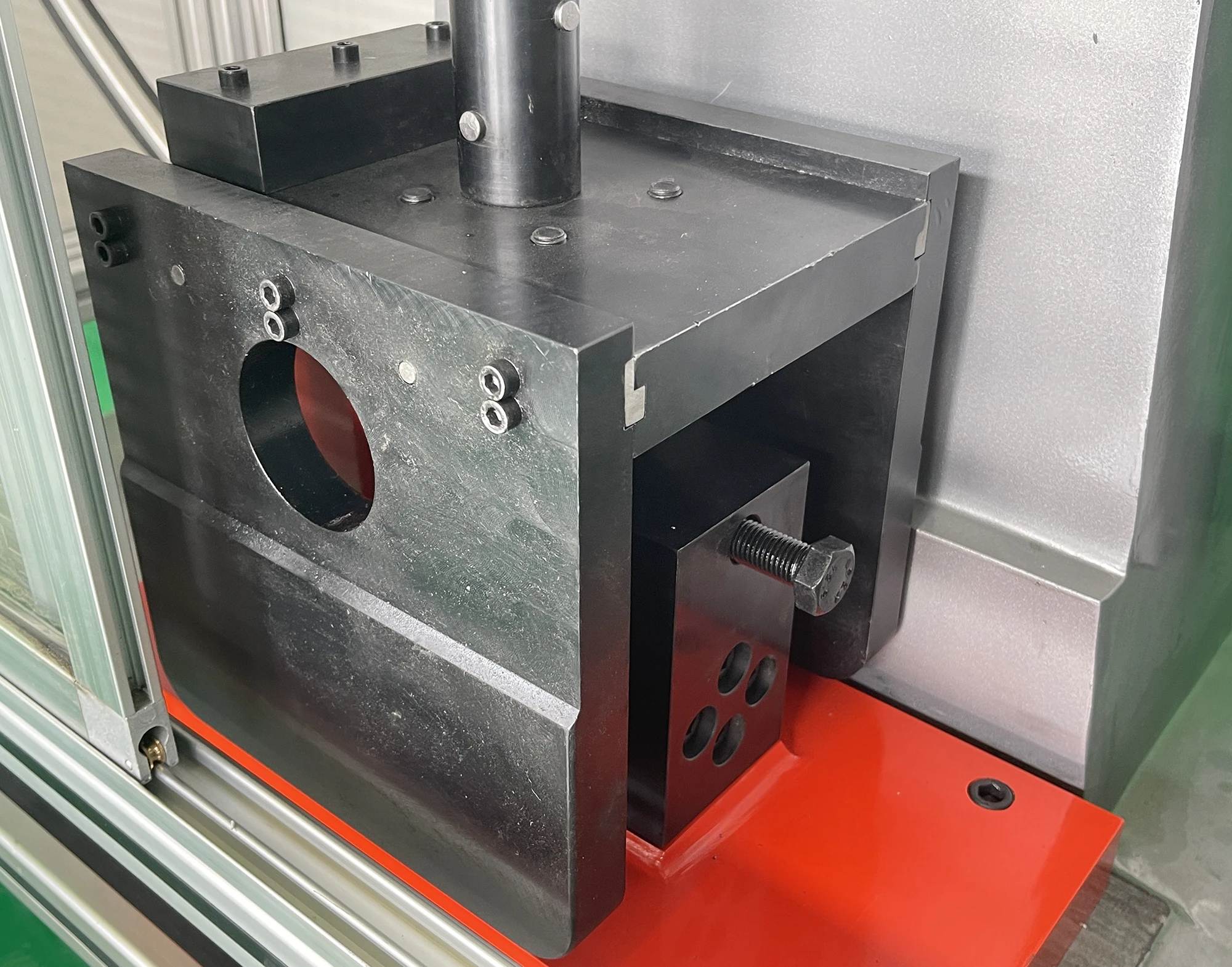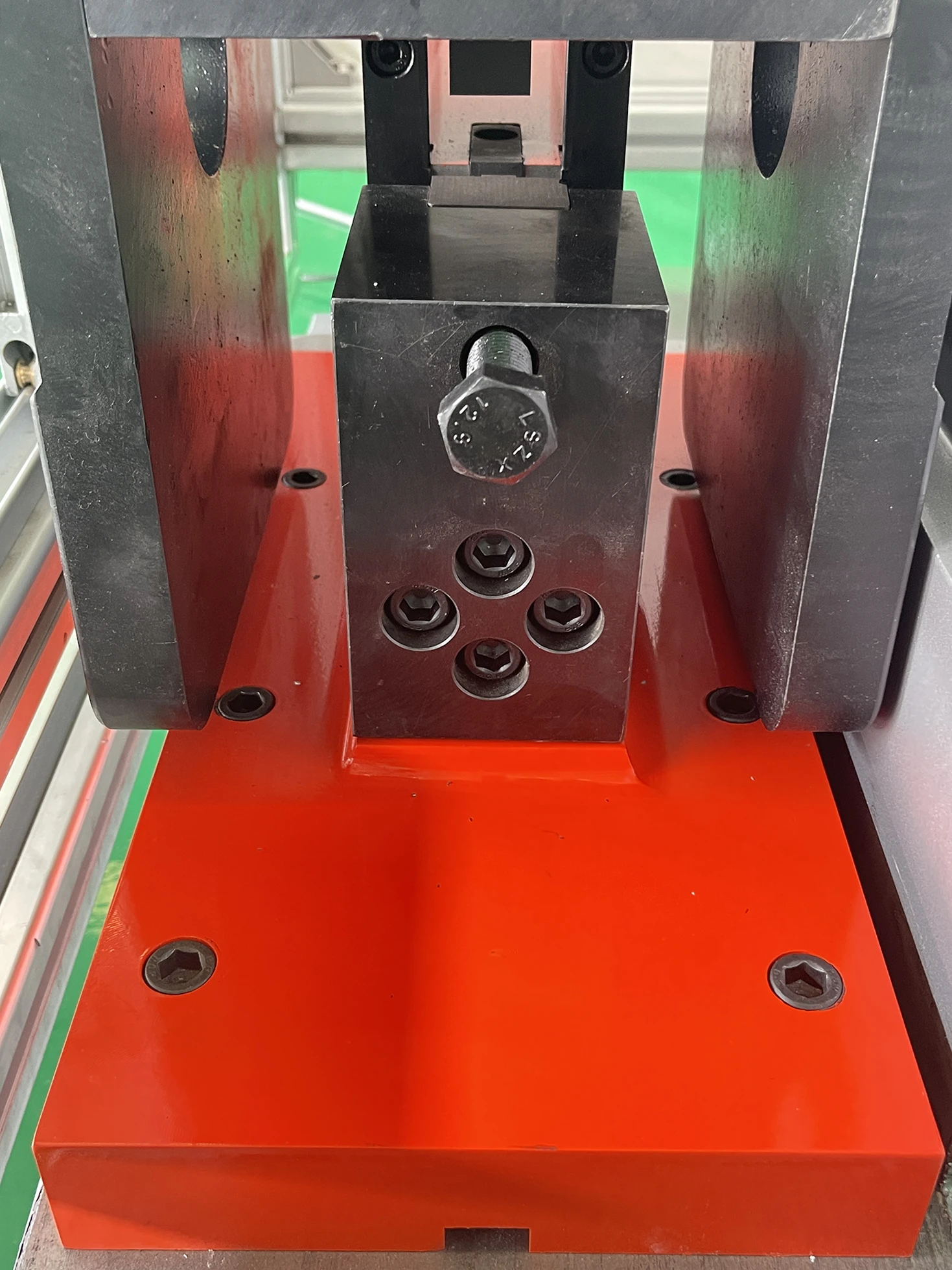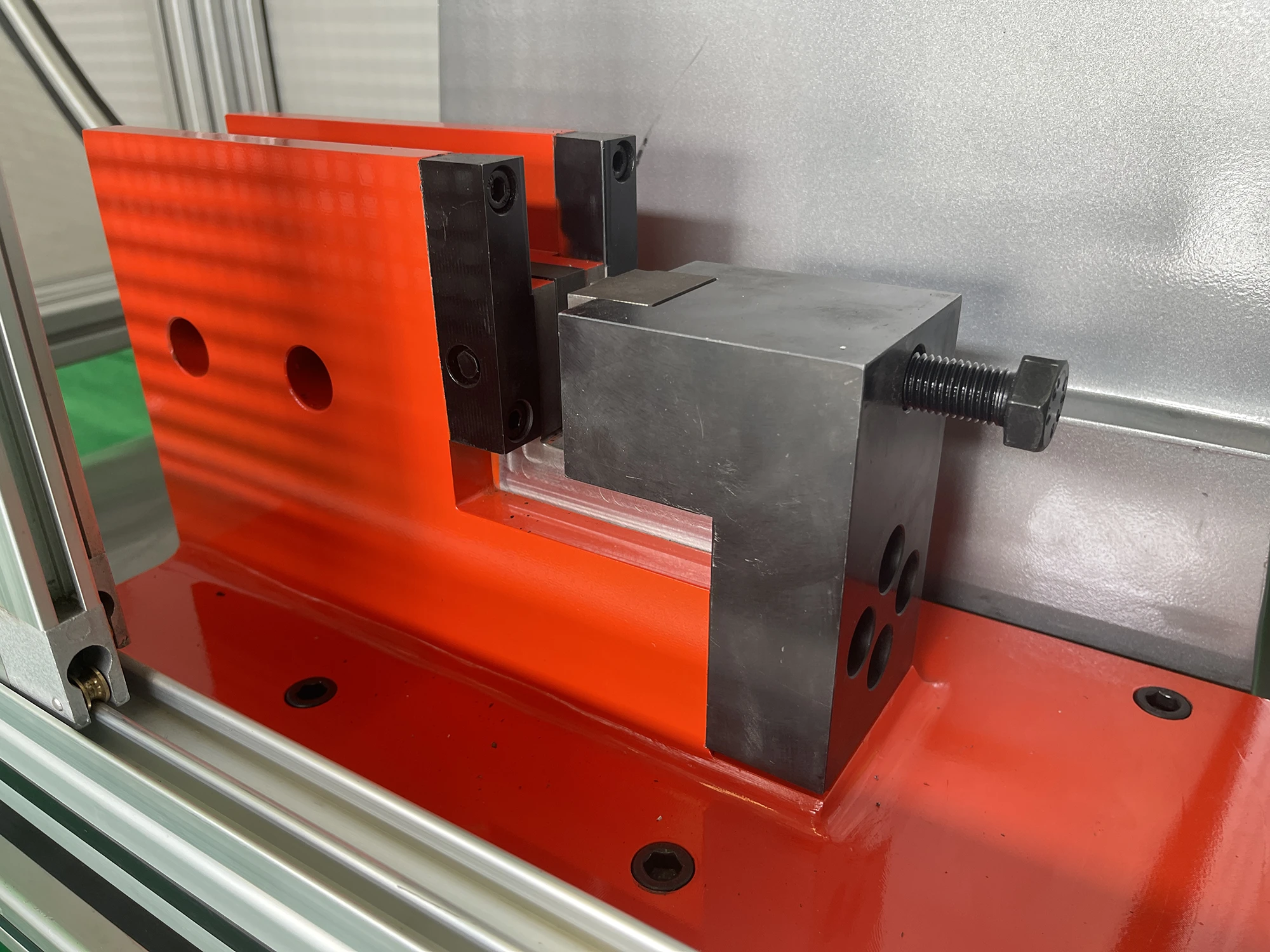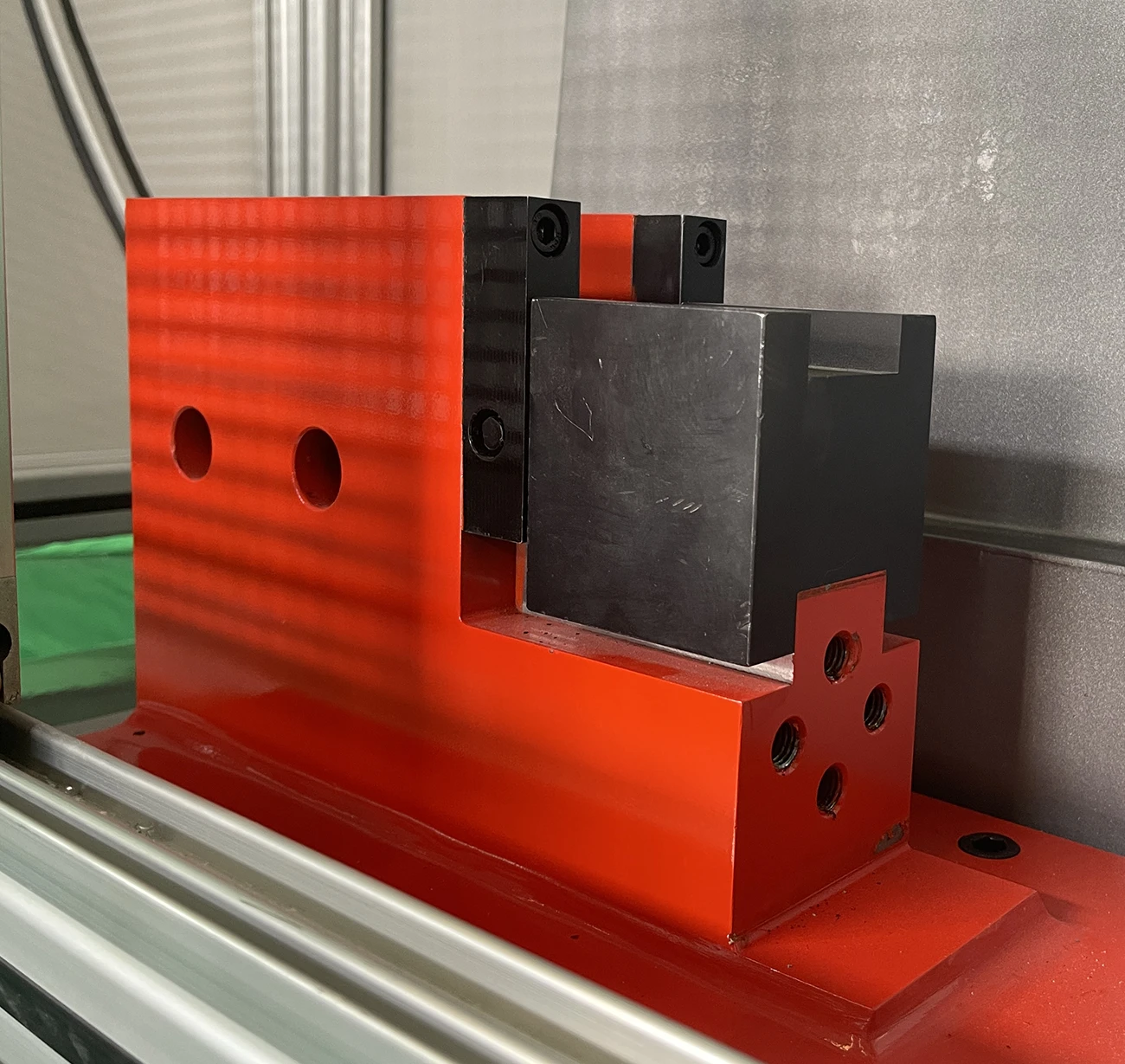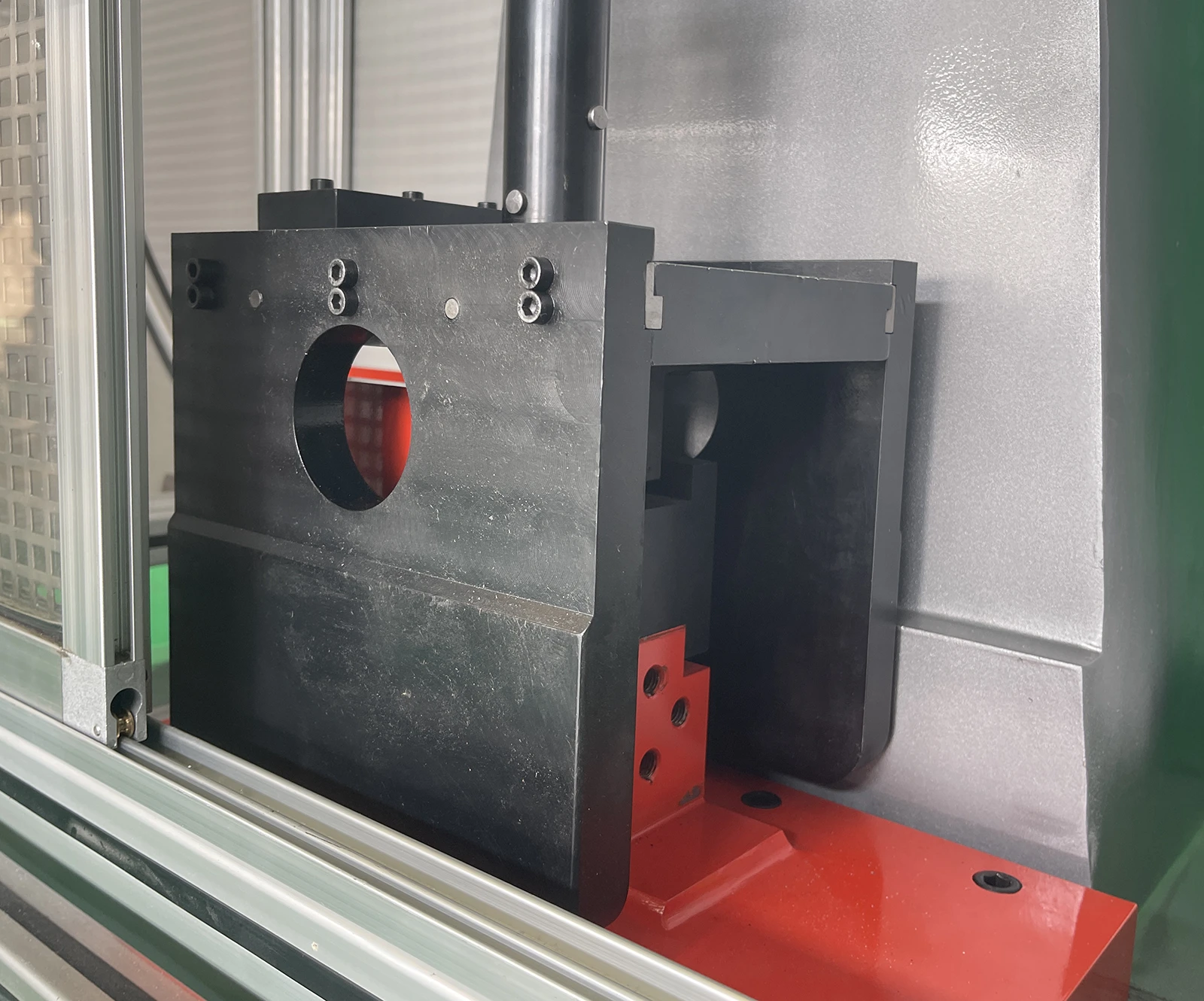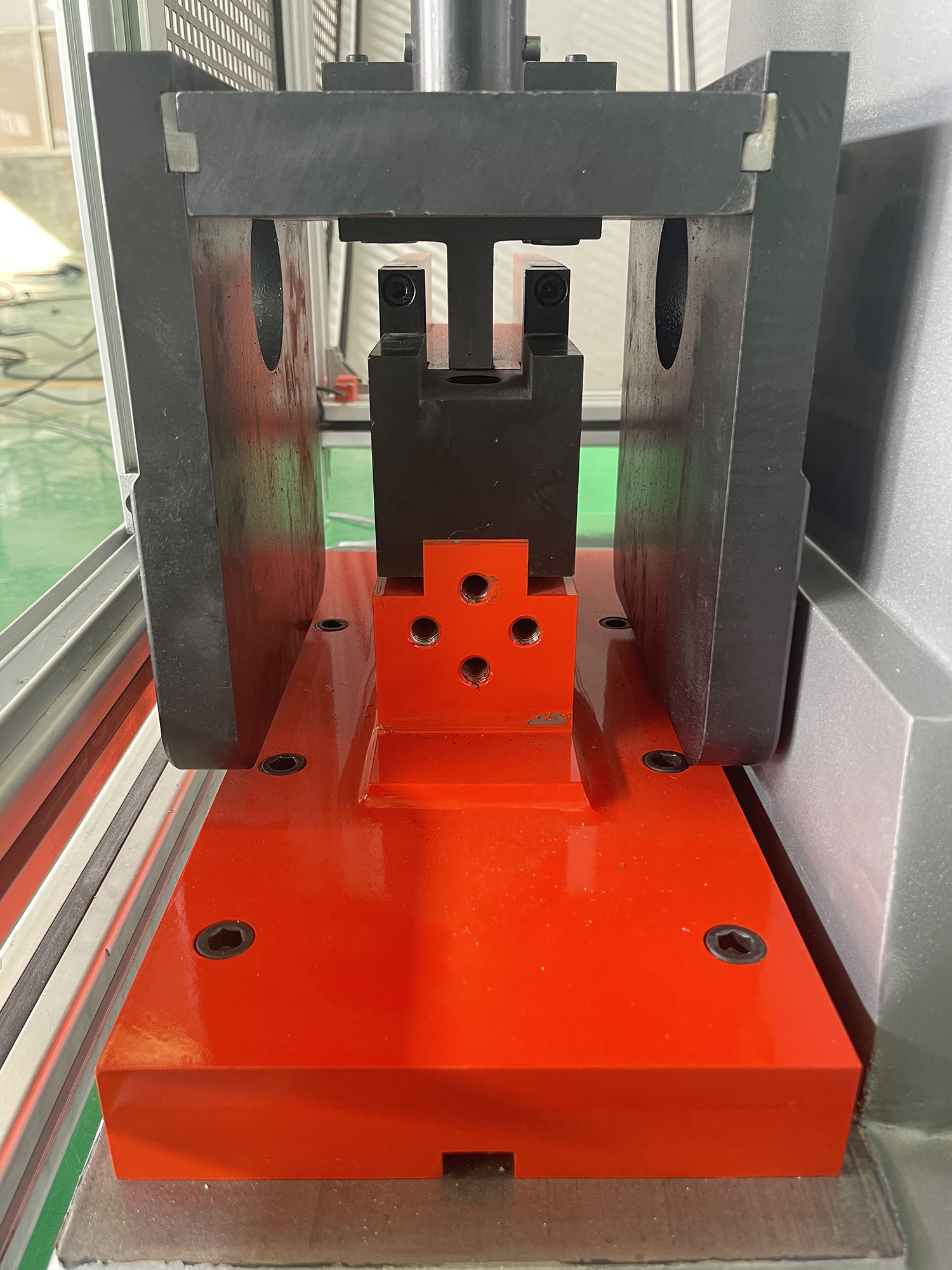Metal Testing Equipment
Standards
ISO 148, EN10045, ASTM E23, ASTM E1820, ASTM E2298, ASTM E74 (Class AA)






Description
The Class D Metals Impact Tester is a Single column impact testing system designed for Charpy and Izod Impact testing according to ASTM E23, ISO 148 and EN10045 industry standards. The Class D has two popular models with peak capacities of 450J (332 ft/lbs) and 750J (553 ft/lbs) with optional pendulums for 150J (111 ft/lbs), 300J (221 ft/lbs), 450J (332 ft/lbs) and 600J (442 ft/lbs). The 450J Model is commonly used in educational institutions, government facilities, laboratories and R&D facilities. The 750J Model is most commonly used in high level industrial manufacturing facilities like steel production, heat treating facilities, aerospace and more. Class D comes standard as a fully enclosed system with the options of adding either a fully automatic specimen feeding system or an automatic cooling cycle.
Metals Impact Tester - Class D - Single Column Charpy & Izod Impact Tester up to 750J
Impact Energy
150J (111 ft/lbs), 300J (221 ft/lbs), 450J (332 ft/lbs), 600J (442 ft/lbs) or 750J (553 ft/lbs)
This system comes standard with an analog and digital readout for higher accuracy along with the option to add the ability to connectthe system to a computer for use with our analysis software. NextGen's Class D is a more durable solution for your high energy pendulum impact requirements allowing further upgrades to be added in the future. Lear more about Pendulum Impact Testers and Testing.
Single-Column Charpy & Izod Impact Tester Main Features
- The heavy cast iron base is mechanically designed to avoid any vibrations having an effect on impact testing results.
- Comes standard with PLC touch controller.
- Single column impact frame (front and rear) provide additional structure and support for high energy testing.
- Standard touch screen display and optional connectivity to a PC for software analysis
- Motor-driven raising of the hammer with auto-return after completion of a test
- Electromagnet locks the pendulum securely
- Fully enclosed testing area for the highest safety while undergoing impact testing
- The pendulum height and weight are precisely designed to ensure high accuracy
- Simple and easy design to exchange the striking knife to meet ISO or ASTM standards
- Designed with a high precision bearing for the most accurate impact results
- Pendulum designed with rounded edges for better wind resistance to reduce any outside factors
- Quality PLC controller for precision pendulum testing
- Optional computer with software control is available for a semi-automatic operation. The operator must only change the specimens while the rest is controlled by the PC.
- Optional specimen feeding system is available. Combined with the computer and software, this allows for fully automatic operation.
- Optional cooling system is available to satisfy cold specimen testing down to -180°C
High-Precision Pendulum Testing Machine Charpy and Izod Technical Specifications
| NG-Impact Class D | ||
|---|---|---|
| Model | NG452 Class D | NG752 Class D |
| Maximum Impact Energy | 450J | 750J (553 ft/lbs) |
| Optional Pendulum | 150J (111 ft/lbs), 300J (221 ft/lbs) | 300J (221 ft/lbs), 450J (332 ft/lbs), 600J (442 ft/lbs) |
| Angle Resolution | 0.025° | |
| Angle of Striking | 150° ±1° | |
| Velocity of Striker | 5.24 m/s | |
| Support Span | 40 mm | |
| Radius of Curvature of Supports | 1 mm | |
| Angle of Slope of Supports | 0° | |
| Angle of Taper of Supports | 11° ± 1° | |
| Radius of Striking Edge | 2 mm | |
| Angle of Striking Tip | 30° | |
| Thickness of Striking | 16 mm | |
| Specimen Dimensions | 55x10x10 mm, 55x10x7.5 mm, 55x10x5mm | |
| Overall Dimensions | 215 x 85 x 210 cm | |
| Weight | 1875 lbs. / 900 kg | |
| Power Consumption | 1.5 kW | |
Configurations
| Name | Description | Model | |||||
|---|---|---|---|---|---|---|---|
| Machine Frame | NG452/752 Class D | NG452 D-2 | NG752 D-2 | NG452 D-3 | NG752 D-3 | NG452 D-4 | NG752 D-4 |
| Framework | Frame | X | X | X | |||
| Pendulum Lock/Release System | X | X | X | ||||
| Driving System | X | X | X | ||||
| Angle Measurement | X | X | X | ||||
| PLC | X | X | X | ||||
| Dial Gauge Display | X | X | X | ||||
| Touch Screen | X | X | X | ||||
| Motor | X | X | X | ||||
| Software | X | X | |||||
| Accessories | Span Block Specimen Centering Block Centering Tongs Standard Tools Anchor Bolts Wedge Block |
X | X | X | |||
| PC Connection | RS232 | X | X | ||||
| Instrumented Impact System | Force Transducer in Pendulum for quick plotting of the force-time graph Access to more testing parameters on GenTest software |
X | |||||
High-Precision Pendulum Testing Machine Specimen Collection and Filtering Device
- Motorized device is used for the collection of broken specimens after undergoing an impact test. Instead of having to manual clean the tester after a test, the collection system will clear the way to avoid the striker becoming stuck.
- Unique specimen filtering function: automatically judge qualified and unqualified specimens to different collection bins
FAQs
ISO 148 is an international standard that defines the method for evaluating metallic materials' notch toughness through Charpy impact testing. Notch toughness refers to a material's ability to absorb energy and resist fracture when subjected to a sudden impact or shock at a specific temperature.
The ISO 148 standard provides guidelines for conducting Charpy impact tests, which involve striking a notched specimen with a pendulum hammer and measuring the amount of energy absorbed during fracture. This test method is widely used to assess materials' ductile-to-brittle transition behaviour and toughness, especially metals and their alloys.
By adhering to ISO 148, manufacturers, researchers, and quality control laboratories can confidently assess the notch toughness of metallic materials. The test results obtained through this standard aid in material selection, process optimization, and structural design, ensuring that materials meet the necessary safety, durability, and performance requirements.
NextGen’s Class D – Dual Column Charpy Impact Tester complies with ISO 148 standard.
Click here to learn more about the product or here to receive a personalized quote.
EN10045 regulates the Charpy impact testing method, a widely used technique for assessing materials' toughness and impact resistance. Developed by CEN, this standard outlines guidelines and specifications for Charpy impact tests. A standard such as this plays a critical role in several industries, such as metallurgy, construction, automotive, and aerospace, where materials' ability to resist sudden impact is important.
EN10045 outlines the procedures for conducting Charpy impact tests, which involve striking a standardized notched specimen with a pendulum hammer. For consistency and accuracy, the standard defines parameters such as the striking angle and the striking velocity. Test results are also recorded and calibration guidelines are provided.
This standard specifies the criteria for evaluating test results based on energy absorbed during impact. In accordance with the standard, two parameters are defined: absorbed energy and lateral expansion, a measure of ductility. These parameters help classify materials into different impact toughness categories, providing valuable information for material selection, quality control, and design purposes.
NextGen’s Class D – Dual Column Charpy Impact Tester complies with EN10045 standard.
Click here to learn more about the product or here to receive a personalized quote.
ASTM E23 is a widely recognized standard developed by the American Society for Testing and Materials (ASTM) for conducting Charpy impact testing. This test method evaluates materials' impact resistance and toughness. The standard provides guidelines for apparatus, specimen preparation, and testing procedures to ensure consistent and accurate results.
The test involves striking a notched or V-notch specimen with a pendulum hammer under specific conditions. The energy absorbed by the specimen during impact is measured and used to assess its toughness and ability to withstand sudden shocks. This standard specifies parameters such as angle of impact, striker velocity, support span, and striking edge dimensions.
Aerospace, automotive, construction, and manufacturing industries rely on ASTM E23 to ensure material quality and reliability. It aids in material selection, design optimization, and quality control. By following the standard, engineers and researchers can obtain reliable and comparable results, allowing them to evaluate different materials and improve product safety.
NextGen’s Class D – Dual Column Charpy Impact Tester complies with ASTM E23 standard.
Click here to learn more about the product or here to receive a personalized quote.
Impact energy, measured in joules (J), quantifies the energy absorbed by a material when subjected to a sudden force or impact. Metal testers, such as pendulum impact testers, use this parameter to assess metal behaviour under dynamic loading conditions. By subjecting a standardized specimen to controlled impact, testers determine the energy required to fracture the material.
The impact energy value obtained from tests offers valuable information about toughness, ductility, and fracture resistance. It helps engineers and researchers understand how metals respond to sudden loads, making it a vital parameter for design, manufacturing, and quality control processes.
Materials with higher impact energy values generally exhibit superior toughness, which is desirable in applications where the material must withstand sudden shocks or impacts. Conversely, low-impact energy values may indicate brittleness, making the material more susceptible to fracture.
The Class D - Dual Column Charpy Impact Tester operates within a range of impact energy options, including 150J, 300J, 450J, 600J, and 750J.
Click here to learn more about the product or here to receive a personalized quote.
The Class D - Dual Column Charpy Impact Tester 450J is widely utilized in various settings, including educational institutions, government facilities, laboratories, and research and development labs.
Educational institutions use the 450J Model to analyze the impact behaviour of diverse materials. This aids in evaluating their suitability for different applications and gaining insights into their fracture characteristics. It serves as a valuable tool for programs related to materials science, mechanical engineering, and metallurgy.
Government facilities rely on the 450J Model for quality control tests on materials utilized in critical infrastructure projects. By assessing structural components' impact resistance, they ensure compliance with safety standards and regulations.
Laboratories and research and development facilities extensively employ the 450J Model. It enables scientists and engineers to conduct in-depth research on the impact and performance of novel materials, refine manufacturing processes, and enhance product design.
Click here to learn more about the product or here to receive a personalized quote.
The 750J Model of Class D - Dual Column Charpy Impact Tester finds its most common usage in high-level industrial manufacturing facilities, including steel production, heat treating facilities, and the aerospace industry.
This model is employed in steel production to determine a steel's impact resistance and toughness. It enables manufacturers to ensure the quality and reliability of their steel products. These products are used in critical applications such as construction, infrastructure, and machinery.
Heat-treating facilities rely on the 750J Model to evaluate the impact behaviour of heat-treated materials, such as hardened steels. By subjecting these materials to controlled impacts, the tester determines their ability to withstand sudden loads and resist fracture.
Aerospace industry structures and components are tested using the 750J Model, a test method known for its stringent safety and quality standards. Using high impact energy, it is possible to assess a material's durability, fracture resistance, and compliance with aviation regulations in a comprehensive manner.
Click here to learn more about the product or here to receive a personalized quote.
Class D - Dual Column Charpy Impact Testers are high-quality impact testers that offer a range of standard features that enhance their versatility and functionality. Designed with a fully enclosed system, these machines provide a controlled testing environment. For increased convenience and efficiency, they can be equipped with options like an automatic specimen feeding system or an automatic cooling cycle.
The Class D models come with both analog and digital readouts, ensuring accurate measurements of impact energy. They also can connect to a computer, enabling seamless integration with analysis software for advanced data processing and reporting.
Class D testers are durable and an excellent choice for high-energy pendulum impact testing. This machine can also be upgraded in the future, allowing even more features to be added to meet the requirements of users as they change.
Click here to learn more about the product or here to receive a personalized quote.
Yes, the Class D - Dual Column Charpy Impact Tester machine is designed to avoid vibrations. Its heavy cast iron base is mechanically engineered to provide stability and minimize vibrations during testing. The use of cast iron as the base material helps to dampen vibrations and ensures that they do not interfere with the accuracy and reliability of the test results.
The robust construction and careful design of the Class D machine prioritize the elimination of vibrations, as any unwanted vibrations could introduce errors or inconsistencies in the impact testing process. By minimizing vibrations, the machine can provide more precise and reliable measurements of impact energy and material properties.
The heavy cast iron base acts as a solid foundation, absorbing and dissipating vibrations from external sources or from the impact itself. This design feature ensures that the machine operates in a stable and controlled environment, enhancing the overall quality and integrity of impact testing results.
Click here to learn more about the product or here to receive a personalized quote.
The Class D - Dual Column Charpy Impact Tester provides additional structure and support for high-energy testing through its design and construction. The dual-column configuration, consisting of front and rear columns, enhances the machine's stability and rigidity during impact testing.
By having two columns, the Class D machine distributes load and force evenly, reducing potential bending or deflection. This ensures that the specimen is accurately positioned and that the impact energy is precisely applied without loss or interference.
The dual-column setup also minimizes vibrations and improves high-energy testing. The machine's structural integrity enables it to withstand powerful impact forces, allowing for reliable and consistent results.
Moreover, the dual-column design allows for a larger working space and accommodates specimens of various sizes and dimensions. This flexibility is advantageous when testing different materials or conducting experiments with specific sample requirements.
Click here to learn more about the product or here to receive a personalized quote.
Yes, the design of Class D - Dual Column Charpy Impact Tester is simple and facilitates easy exchange of the striking knife. This feature allows users to adapt the machine to meet ISO or ASTM standards.
The Class D model is engineered with a user-friendly approach, considering the importance of versatility and compatibility with different testing standards. The process of exchanging the striking knife is designed to be straightforward, ensuring that users can quickly and efficiently switch between different knife options.
In addition to saving time, the simple design ensures accuracy and reliability in impact testing. By providing an easy means to exchange the striking knife, the Class D machine enables users to select the appropriate knife configuration for their specific testing needs. This ensures compliance with international standards and enhances impact testing precision.
Click here to learn more about the product or here to receive a personalized quote.
The Class D - Dual Column Charpy Impact Tester is purposely designed to minimize the effect of wind resistance during testing, although complete elimination is not feasible. The machine incorporates various features that work together to mitigate the impact of wind and ensure accurate and dependable results.
To address the potential influence of wind on the pendulum's motion, the Class D tester incorporates a thoughtful design element with rounded ends on the pendulum. This design choice reduces the exposed surface area, allowing the pendulum to move more smoothly through the air. It also minimizes any disruptions caused by wind resistance.
By reducing wind resistance, the Class D machine aims to lessen the impact of external factors on the test results. This is particularly when precise measurements of impact energy and material properties are crucial.
It is worth noting, however, that while the Class D machine is designed to minimize wind resistance, maintaining a controlled testing environment remains vital. It is highly recommended to conduct tests in a controlled laboratory setting with minimal air currents in order to ensure the highest level of accuracy and reliability in test outcomes.
Click here to learn more about the product or here to receive a personalized quote.
The Class D - Dual Column Charpy Impact Tester is equipped with a high-quality PLC (Programmable Logic Controller) controller specifically designed for precision pendulum testing. This advanced controller enhances the accuracy and reliability of the testing process, ensuring precise measurements and consistent results.
The PLC controller in the Class D machine incorporates sophisticated algorithms and precise measurement techniques to effectively monitor and control the pendulum's motion. It allows for precise adjustments of various testing parameters, including the angle of strike, striker velocity, and support span, to meet specific testing requirements.
With its robust control capabilities, the PLC controller ensures real-time monitoring, feedback, and precise control over the testing procedure. Operators can rely on the digital display or interface provided by the PLC controller to access comprehensive information about the test parameters, results, and relevant data.
The user-friendly PLC controller facilitates operation and simplifies testing. Its intuitive interface enables operators to navigate through the settings and make necessary adjustments easily.
Click here to learn more about the product or here to receive a personalized quote.
The Class D - Dual Column Charpy Impact Tester offers a convenient option for semi-automatic operation through computer and software control. With this feature, the operator can effortlessly change the specimens while the PC controls the remaining testing process. Automation brings several advantages.
Computer and software control ensures precise and consistent testing parameters in the Class D tester. The software enables accurate control of the pendulum's motion, striking angle, velocity, and other critical variables. The level of control enhances the reliability and repeatability of the test results.
Moreover, the computer interface provides a user-friendly and intuitive platform for the operator. It offers clear visual displays of real-time data, test parameters, and analysis tools. The software also simplifies data acquisition and storage, eliminating manual recording and reducing the risk of human errors.
The semi-automatic operation option significantly streamlines the testing procedure, improving overall efficiency. With the PC handling the control aspects, the operator can focus on specimen handling and preparation, ultimately saving time and effort.
Click here to learn more about the product or here to receive a personalized quote.
Yes, the Class D - Dual Column Charpy Impact Tester offers an optional specimen feeding system. This system is designed to enhance the testing process by automating specimen handling and feeding tasks.
By integrating the optional specimen feeding system into the Class D tester, the operator can enjoy increased efficiency and convenience during testing. The system eliminates the manual handling of specimens, reducing error risk and ensuring consistent testing conditions.
When combined with computer and software control, the optional specimen feeding system enables fully automatic operation. Automating the entire test process is accomplished using the computer and software controls. This integration allows for precise and reliable specimen placement, reducing the reliance on manual intervention.
The optional specimen feeding system is particularly beneficial in scenarios where large numbers of specimens need to be tested or repetitive testing is required. It saves time and effort for the operator, allowing them to focus on other entail tasks while the system handles specimen feeding.
Click here to learn more about the product or here to receive a personalized quote.
Yes, the Class D - Dual Column Charpy Impact Tester offers an optional cooling system specifically designed to cater to cold specimen testing requirements down to -180°C.
The optional cooling system is a valuable addition for applications that involve testing materials or specimens at extremely low temperatures. It provides the necessary cooling capacity to maintain the desired temperature range throughout the testing process.
By utilizing an optional cooling system, the Class D tester ensures accurate and reliable testing results even under challenging low-temperature conditions. This is particularly critical in industries such as aerospace, automotive, and materials research, where the impact behaviour of materials at sub-zero temperatures is of critical importance.
The cooling system operates efficiently to achieve and maintain the desired temperature, ensuring the integrity of the testing environment. It offers precise temperature control, allowing consistent and repeatable testing conditions.
Click here to learn more about the product or here to receive a personalized quote.
These optional pendulum measurements allow users to customize impact energy levels according to their specific testing requirements. By selecting the appropriate pendulum measurement, users can conduct tests at varying impact energy levels. This enables a comprehensive analysis of material behaviour under different conditions.
The NG452 Class D model's optional pendulum measurements cater to a wide range of applications and industries. The 150J and 300J pendulum measurements are suitable for testing materials with lower impact energy requirements, while the 450J and 600J pendulum measurements offer higher impact energy levels for more demanding applications.
The availability of these optional pendulum measurements ensures that the NG452 Class D can be tailored to meet the specific needs of various testing scenarios. It provides users with the flexibility to select the most suitable impact energy level for their materials, allowing for accurate and reliable testing results.
Click here to learn more about the product or here to receive a personalized quote.
The NG752 Class D - Dual Column Charpy Impact Tester offers optional pendulum measurements of 150J and 300J. These pendulum options allow users to customize impact energy levels based on their specific testing needs.
The 150J pendulum measurement is suitable for testing materials that require lower impact energy levels. It provides a controlled and precise testing environment, allowing accurate evaluation of material behaviour and fracture characteristics.
The 300J pendulum measurement offers a slightly higher impact energy level, providing versatility in testing a wide range of materials. It is suitable for applications that require moderate impact energies, allowing for comprehensive analysis and assessment of material properties.
By having these optional pendulum measurements available, the NG752 Class D provides flexibility and adaptability in impact testing. Users can select the most appropriate pendulum measurement based on the materials being tested and the desired impact energy level. This ensures accurate and reliable results, enabling researchers, engineers, and quality control professionals to make informed decisions about material performance and suitability for various applications.
Click here to learn more about the product or here to receive a personalized quote.
The Class D - Dual Column Charpy Impact Tester features 0.025° angle resolution. This means that the machine can accurately measure and record the angle of striking with a high level of precision.
The angle resolution of 0.025° allows for a detailed and precise analysis of the impact testing process. It enables researchers, engineers, and quality control professionals to evaluate materials' behaviour under different striking angles and assess their performance accurately.
With such fine resolution, even subtle changes in the angle of striking can be detected and recorded. This provides valuable insights into the material's response to impact forces. This level of precision is crucial for understanding fracture behaviour, identifying weaknesses or defects, and optimizing material properties.
The high-angle resolution enhances the Class D tester's capabilities in conducting advanced impact testing, making it suitable for a range of applications in various industries. It ensures that precise measurements are obtained, contributing to reliable data and meaningful analysis.
Click here to learn more about the product or here to receive a personalized quote.
The Class D - Dual Column Charpy Impact Tester specifies an angle of striking of 150° ±1°. This means that the machine is designed to strike the test specimen at an angle of 150 degrees with a tolerance of ±1 degree.
The precise control of the angle of striking is crucial in impact testing as it directly influences the test results and the behaviour of the material being tested. The specified range of 150° ±1° ensures consistency and accuracy in the testing process, minimizing variations and providing reliable data for analysis.
A Class D tester maintains a consistent angle of striking, which allows researchers and engineers to compare and evaluate the impact resistance of different materials under standardized conditions. In this way, strengths and weaknesses of the material can be identified fairly and objectively.
The tight tolerance of ±1° ensures that the striking angle remains within a narrow range, reducing the potential for errors and deviations in test results. This level of precision is essential for conducting reliable impact tests and obtaining consistent and repeatable data.
Click here to learn more about the product or here to receive a personalized quote.
The Class D - Dual Column Charpy Impact Tester operates with a striker velocity of 5.24 m/s. This determines the speed at which the striker impacts the specimen during testing. This velocity plays a crucial role in the energy transfer and impact behaviour of the material being tested.
By maintaining a consistent 5.24 m/s velocity, the Class D tester ensures standardized and controlled impact conditions. These conditions are essential for accurate and reliable test results. This velocity value is carefully selected to meet industry standards and testing requirements, allowing for precise evaluation of a material's resistance to impact forces and its ability to withstand sudden loads.
The controlled and consistent velocity of the striker in the Class D tester enables meaningful comparisons between different materials, aiding in material selection, quality control, and performance assessment. It provides valuable data that helps engineers and researchers make informed decisions regarding material properties and applications.
Click here to learn more about the product or here to receive a personalized quote.
The support span of the Class D - Dual Column Charpy Impact Tester is 40 mm. The support span refers to the distance between the supports on which the specimen is placed during the impact test.
Having a support span of 40 mm provides a standardized and consistent setup for impact tests. This specific distance ensures that the specimen is properly supported and positioned for accurate and reliable results.
The 40 mm support span is designed to accommodate various specimen sizes and shapes, allowing flexibility in testing different materials. It provides stability and control during the impact test, minimizing any potential effects of uneven support on test results.
By maintaining a consistent support span, the Class D machine ensures reproducibility and comparability of test outcomes. This is particularly pertinent when evaluating the impact behaviour and properties of different materials for quality control, research, or compliance purposes.
Click here to learn more about the product or here to receive a personalized quote.
The Class D - Dual Column Charpy Impact Tester features supports with a 1 mm curvature radius. This carefully designed curvature ensures precise and consistent contact between the supports and the specimen during impact testing.
The 1 mm radius of curvature is intentionally chosen to minimize any irregularities or inconsistencies on the support surface, ensuring accurate and reliable results. It facilitates a uniform distribution of contact pressure, reducing the risk of localized stress concentrations on the specimen.
The 1 mm curvature radius is optimized to meet industry standards and testing requirements. It is particularly crucial when evaluating materials with small dimensions or fragile structures, as it helps prevent excessive deformation or damage during testing.
By maintaining a consistent radius of curvature on the supports, the Class D tester ensures impact forces are evenly distributed across the specimen. This promotes accurate measurements of the material's impact resistance and fracture behaviour.
Click here to learn more about the product or here to receive a personalized quote.
The Class D - Dual Column Charpy Impact Tester has a support slope angle set at 0°. This means that the supports are designed for a flat and level surface, providing stability and consistent contact during impact testing.
By having an angle of slope of supports of 0°, the machine ensures that the specimen is held securely and evenly, allowing for accurate and reliable test results. The flat supports minimize any potential variations in support contact, reducing the risk of introducing additional variables into the testing process.
This design feature is particularly significant when evaluating materials' impact behaviour, as it allows for consistent loading conditions and reliable comparisons between different specimens.
The Class D machine's 0° slope of supports reflects its attention to detail and precision in maintaining a controlled testing environment. It contributes to the machine's overall performance and reliability, making it a valuable tool for material testing and research applications.
Click here to learn more about the product or here to receive a personalized quote.
The angle of taper of supports in the Class D - Dual Column Charpy Impact Tester is 11° ± 1°. This means that the supports have a tapered design with an angle of 11 degrees, with a tolerance of plus or minus 1 degree.
The tapered supports play a critical role in the testing process by providing a controlled and stable platform for the specimen during impact testing. The specific angle of the taper is designed to ensure consistent and accurate results by facilitating proper specimen positioning and minimizing any potential interference or misalignment.
The 11° ± 1° taper angle allows for slight variations in the taper angle while maintaining overall stability and repeatability in the testing process. It provides a balanced combination of support and ease of specimen placement, ensuring reliable and consistent testing outcomes.
By incorporating an adjustable taper angle within a defined range, the Class D machine accommodates different testing requirements and specimen dimensions, providing flexibility and adaptability in the testing process.
Click here to learn more about the product or here to receive a personalized quote.
The Class D - Dual Column Charpy Impact Tester has a 2 mm striking edge radius. This means that the edge of the striking component, such as the pendulum or striker, has a rounded shape with a radius of 2 mm.
The radius of the striking edge is a crucial parameter in impact testing as it influences the stress distribution and contact area during impact. A smaller radius provides a more concentrated force, while a larger radius distributes it over a wider area. The specific radius chosen depends on the testing requirements and standards being followed.
With a 2 mm striking edge radius, the Class D machine delivers controlled and precise impacts on test specimens. This radius ensures consistent and accurate results by providing a well-defined striking point on the specimen surface.
The 2 mm radius of the striking edge balances concentrated force and contact area. This makes it suitable for a wide range of impact testing applications. It allows for reliable assessment of material properties, fracture behaviour, and performance under dynamic loading conditions.
Click here to learn more about the product or here to receive a personalized quote.
The Class D - Dual Column Charpy Impact Tester features an angle of striking tip of 30°. This means that the tip of the striking instrument is inclined at a 30-degree angle from the vertical plane.
The 30° angle of the striking tip is designed to provide a specific impact configuration during testing. It ensures consistent and standardized contact between the striking tip and the test specimen, resulting in accurate and reproducible test results.
The chosen 30° angle is based on established industry standards and testing requirements. It is carefully selected to optimize impact conditions and replicate real-world scenarios where materials experience impact forces at similar angles.
By maintaining a fixed angle of the striking tip, the Class D machine ensures impact tests uniformity and reliability. This enables researchers, engineers, and quality control personnel to assess and compare the impact resistance of different materials with confidence.
Click here to learn more about the product or here to receive a personalized quote.
The Class D - Dual Column Charpy Impact Tester has a striking 16 mm thickness. This refers to the thickness of the component that delivers the impact force during the testing process.
The 16 mm striking thickness is carefully designed to ensure a consistent and controlled impact on the test specimens. It plays a crucial role in delivering the desired energy transfer and accurately simulating real-world impact conditions.
The selection of a specific striking thickness depends on the testing requirements, the type of materials being tested, and the applicable standards or regulations. The 16 mm striking thickness provides a balance between delivering sufficient impact energy and maintaining the necessary structural integrity of the striking component.
By specifying a 16 mm striking thickness, the Class D tester offers a reliable and standardized configuration for conducting impact tests. This facilitates accurate results comparison across different tests and ensures consistent and repeatable testing procedures.
Click here to learn more about the product or here to receive a personalized quote.
The Class D - Dual Column Charpy Impact Tester supports multiple specimen dimensions, providing flexibility in conducting impact tests. The available specimen dimensions for this machine are 55x10x10 mm, 55x10x7.5 mm, and 55x10x5 mm.
These different specimen sizes allow testing materials of varying thicknesses and geometries. The 55 mm width and 10 mm thickness remain consistent across all options, ensuring standardized testing conditions. However, the specimen height can be chosen based on specific testing requirements.
By offering a range of specimen dimensions, the Class D machine accommodates different material types and applications. Researchers and engineers can select the appropriate specimen size that aligns with their testing objectives and the properties of the material under investigation.
The availability of multiple specimen dimensions enhances the versatility of the Class D tester. This makes it suitable for a wide range of materials, including metals, alloys, plastics, composites, and more. This allows for comprehensive material characterization and assessment of impact behaviour under various conditions.
Click here to learn more about the product or here to receive a personalized quote.
The overall dimensions of the Class D - Dual Column Charpy Impact Tester are 215 cm in length, 85 cm in width, and 210 cm in height. These measurements represent the machine's physical size when fully assembled. They provide an indication of the space required for its installation and operation.
The compact design of the Class D tester allows for efficient use of laboratory or testing space. Its dimensions are carefully designed to strike a balance between accommodating the necessary components and ensuring practicality in various settings.
The 215 cm length provides sufficient space for the pendulum swing and the impact testing process. The 85 cm width allows for stability and proper positioning of the specimen and supports. The 210 cm height accommodates the vertical movement of the pendulum and ensures adequate clearance for the overall operation of the machine.
These dimensions offer a compact and functional footprint, making the Class D tester suitable for installation in educational institutions, laboratories, research and development facilities, and industrial settings. The machine's manageable size allows it to be integrated into existing workspaces or dedicated testing areas easily.
Click here to learn more about the product or here to receive a personalized quote.
The Class D - Dual Column Charpy Impact Tester weighs 900 kg. This significant weight reflects the machine's robustness and solid construction, ensuring stability and precision during impact testing operations. The substantial weight plays a crucial role in minimizing vibrations and maintaining the integrity of the testing process, allowing for accurate and reliable results.
The 900 kg weight of the Class D machine contributes to its durability and long-term performance. It signifies the machine's ability to withstand heavy usage and harsh testing conditions without compromising its functionality. The sturdy build of the equipment instills confidence in its reliability. This makes it suitable for a wide range of applications in educational institutions, research laboratories, government facilities, and industrial settings.
Moreover, the substantial weight adds to the overall stability of the machine, reducing the likelihood of unwanted movement or displacement during impact testing. This stability is essential for ensuring precise and consistent test results, as it helps eliminate external factors that could interfere with the accuracy of the measurements.
Click here to learn more about the product or here to receive a personalized quote.
The power consumption of the Class D - Dual Column Charpy Impact Tester consumes 1.5 kW. This measurement represents the amount of electrical power required by the machine to operate effectively during impact testing.
By consuming 1.5 kW of power, the Class D tester strikes a balance between energy efficiency and performance. As it optimizes power usage, it ensures that the machine's components, such as the motor, electronics, and control systems, receive the necessary power.
The 1.5 kW power consumption enables the Class D tester to generate the force and motion required for accurate and reliable impact tests. It provides ample power for the pendulum to swing at the desired velocity and strike the specimen effectively. This facilitates precise impact energy measurement.
It is imperative to note that the actual power consumption may vary depending on the specific configuration and operating conditions of the Class D tester. Nevertheless, the 1.5 kW rating serves as a reference point for understanding the machine's electrical power requirements.
Click here to learn more about the product or here to receive a personalized quote.
The Class D - Dual Column Charpy Impact Tester incorporates high-precision bearings to ensure accurate impact measurements. Specifically, it features precision ball bearings as a crucial component.
Precision ball bearings enable smooth and precise rotation with minimal friction. They consist of inner and outer rings, between which small balls are positioned. These balls facilitate the controlled movement of rotating parts, such as the pendulum and striker, with exceptional precision.
By utilizing high-precision bearings, the Class D machine effectively minimizes potential disruptions and inaccuracies arising from friction during impact testing. The smooth rotation and precise movement of components enable consistent and reliable measurements of impact energy and performance.
The incorporation of precision ball bearings in the Class D tester reflects a commitment to achieving the highest accuracy levels in impact testing. It ensures the machine delivers dependable and repeatable results, establishing its value as a crucial tool in material testing, research, and quality control applications.
Click here to learn more about the product or here to receive a personalized quote.
The Class D - Dual Column Charpy Impact Tester comes equipped with a standard touchscreen display that can be connected to a PC for software analysis. This optional connectivity feature allows seamless integration between the machine and analysis software, enhancing data processing and reporting capabilities.
By connecting the touchscreen display to a PC, users can access advanced analysis tools and functionality. The PC serves as a platform for running analysis software, enabling in-depth data processing, visualization, and interpretation of test results. The intuitive touchscreen interface facilitates easy interaction with the machine and effortless navigation through software features.
The combination of a touchscreen display and PC connectivity provides a comprehensive solution for precise impact testing and comprehensive data analysis. This connectivity option enhances versatility and efficiency for researchers, quality control professionals, and material testing specialists. It empowers them to leverage software analysis for valuable insights, process improvement, and informed decision-making based on test results.
Click here to learn more about the product or here to receive a personalized quote.
The ultimate user-friendliness of the Class D - Dual Column Charpy Impact Tester is achieved through several key features designed to simplify operation and enhance the overall user experience.
Firstly, the machine incorporates an intuitive and user-friendly interface, making it easy for operators to navigate through the testing process. Clear and concise instructions are provided on the touchscreen display, allowing users to easily set up and execute impact tests.
Additionally, the Class D tester is equipped with automated functions to streamline testing procedures. Optional features such as a specimen feeding system and automatic cooling cycle reduce manual intervention, saving time and effort for operators.
The inclusion of a touchscreen display further enhances user-friendliness, providing a modern and interactive interface for accessing and adjusting test parameters. Operators can easily input and monitor data, view real-time results, and access advanced features for analysis and reporting.
Furthermore, the Class D machine is designed with safety and convenience in mind. Safety interlocks and protective enclosures ensure operator protection during testing. In addition, ergonomic considerations such as adjustable working heights and easy specimen loading/unloading contribute to overall user comfort.
Click here to learn more about the product or here to receive a personalized quote.
The Class D - Dual Column Charpy Impact Tester comes with the advantage of lifetime product support. This means that customers who purchase the machine receive ongoing assistance and guidance throughout the product's lifespan.
Lifetime product support includes various forms of assistance to ensure optimal performance and longevity. It typically includes technical support from knowledgeable experts who can address any queries or concerns regarding the operation, maintenance, or troubleshooting of the tester. They can provide guidance on proper usage, calibration, and recommended maintenance procedures.
Additionally, lifetime product support may also include access to software updates, documentation, and training materials. This ensures that customers stay up-to-date with the latest advancements and improvements related to the Class D tester.
Having access to lifetime product support is highly beneficial as it provides peace of mind and reassurance to customers. They can rely on the manufacturer's expertise and assistance whenever they encounter challenges or require additional information.
Click here to learn more about the product or here to receive a personalized quote.
Related Products
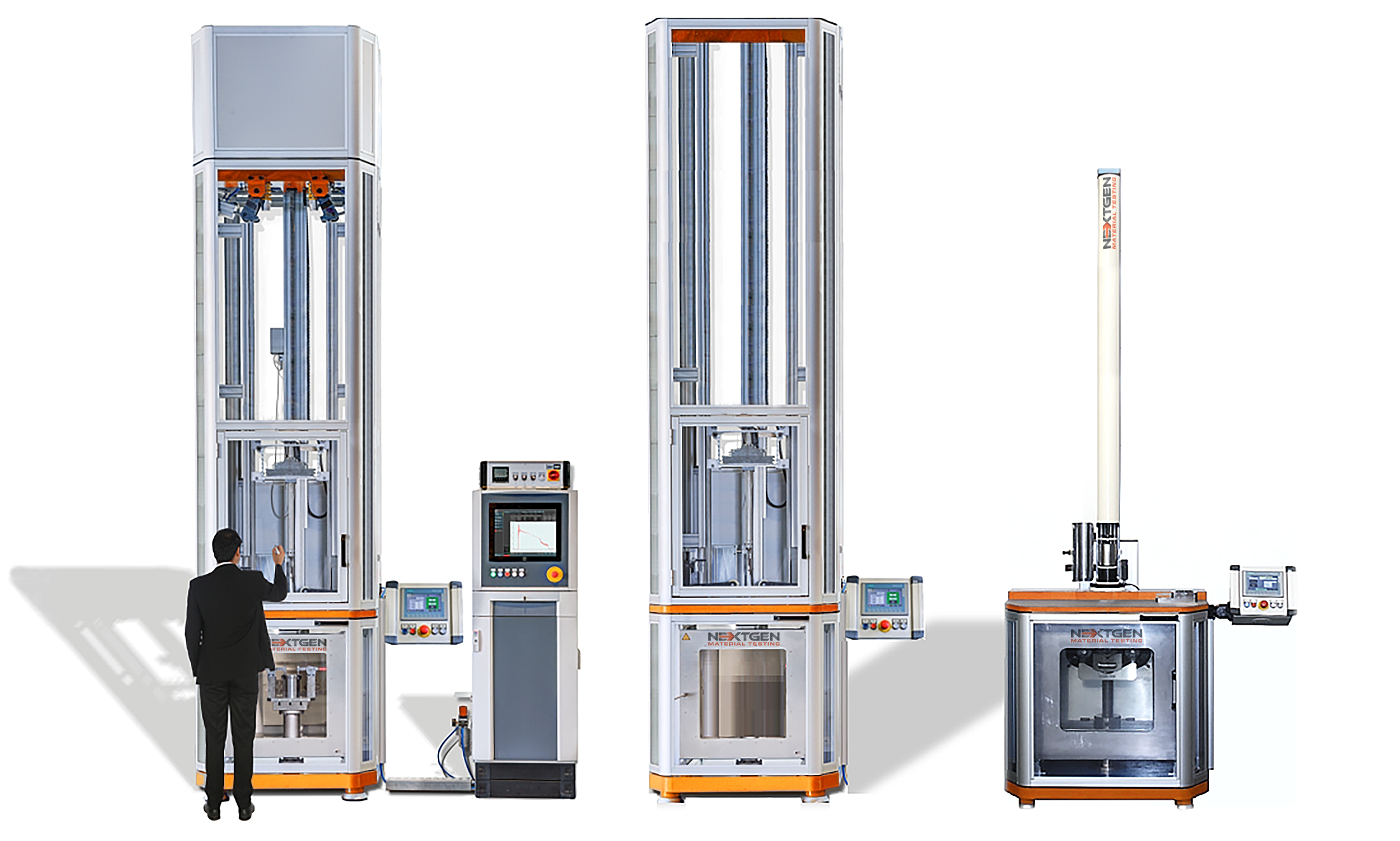
Low-capacity Vertical Drop Weight Testers Up To 2000J NG-FWT1 & NG-FWT2
Discover NextGen's NG-FWT1 & NG-FWT2 low-capacity drop weight testers up to 2000J (1475 ft/lbs), designed for precise impact resistance testing of metals & non-metals.
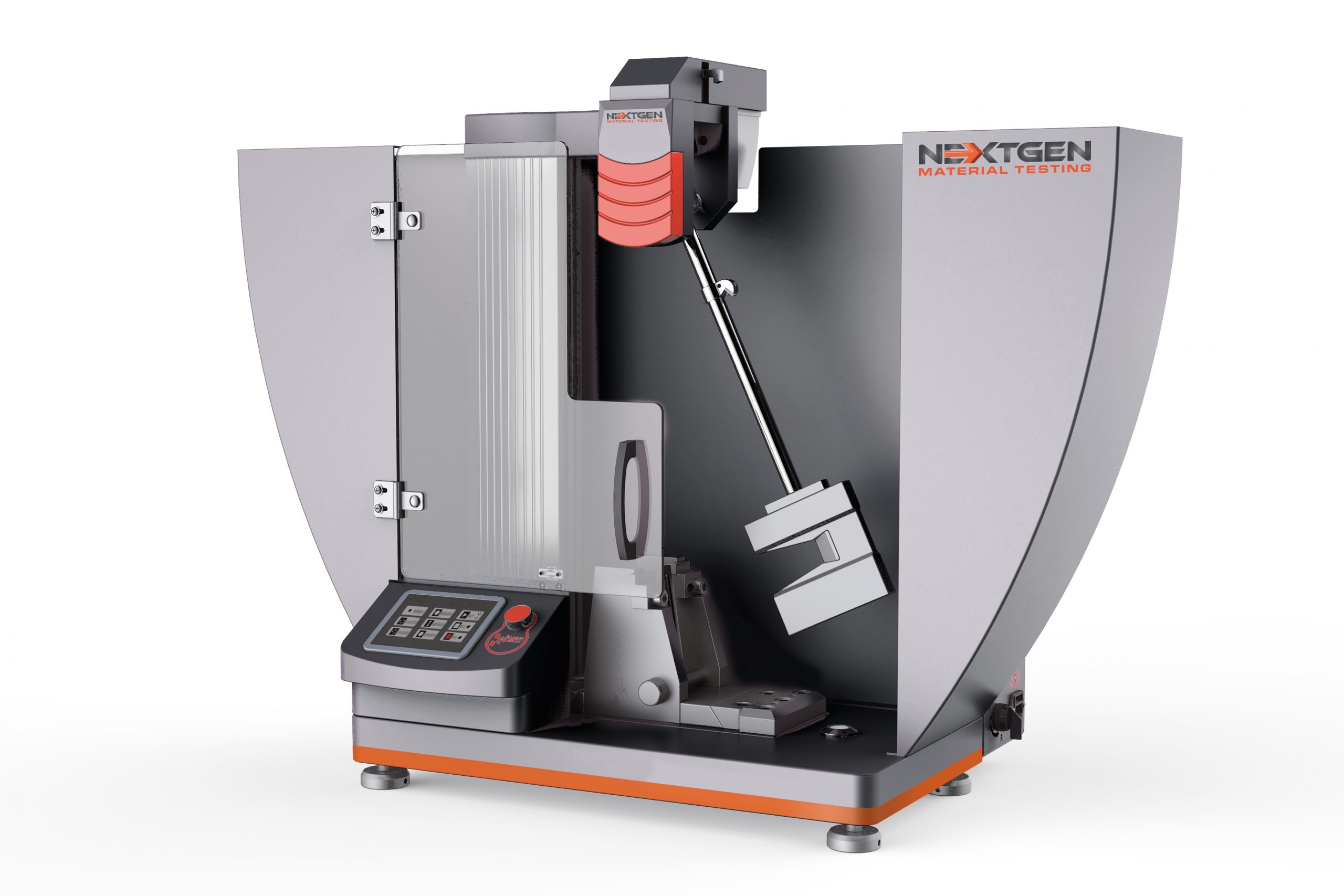
Class J - Charpy and Izod Automatic Impact Testing System - 1J - 50J
Class J is widely used for lzod and Charpy impact test on softer metals, plastics and rubber specimens. Equipped with tensile impact pendulum and fixtures, it can carry on tests on plastic film and sheet. The newly enhanced design offers the most cost-effective configuration to address Charpy test from 1J to 50J (0.7 - 37 ft/lbs), and lzod test from 1J to 22J (0.7 - 16 ft/lbs).
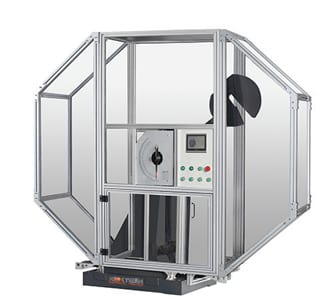
Class H - Servo-Motor Dual Column Charpy Impact Tester - 300J, 450J, 600J or 750J
NextGen's Class H – Servo-Motor Dual Column Charpy Impact Testing system offers of an exceptional combination of versatility and robust build. This impact system provides our most durable options designed with a dual column configuration. The system offers the ultimate versatility of testing 300J (212 ft/lbs), 450J (332 ft/lbs), 600J (442 ft/lbs) and a maximum of 750J (553 ft/lbs) capacities based on both Charpy and Izod test methods. The unit comes standard equipped with a servo motor and is designed to test at any preset angle. The unit comes standard with all the functions of our Class G tester as well as enhanced functionality upgrade of a force transducer inside the strikerwhich enables the determination of characteristic force, energy and displacement parameters such as pre-maximum force energy (Wm), the post maximum force energy, the general yield force (Fgy), the force at brittle fracture initiation (Fbf) and the arrest force (Fa).
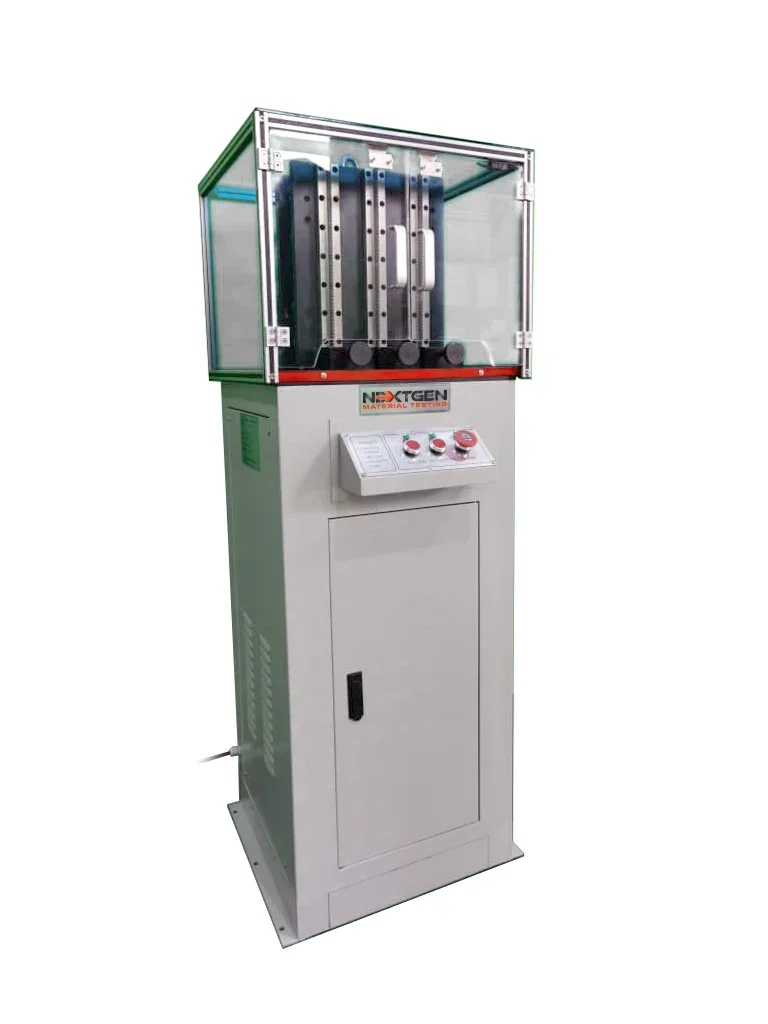
Triple Specimen Chamber Motorized Charpy Notch Making Machine
The GenNotch 4000UPG Series is a motorized Charpy & Izod Notch Making Machine with a triple specimen chamber.
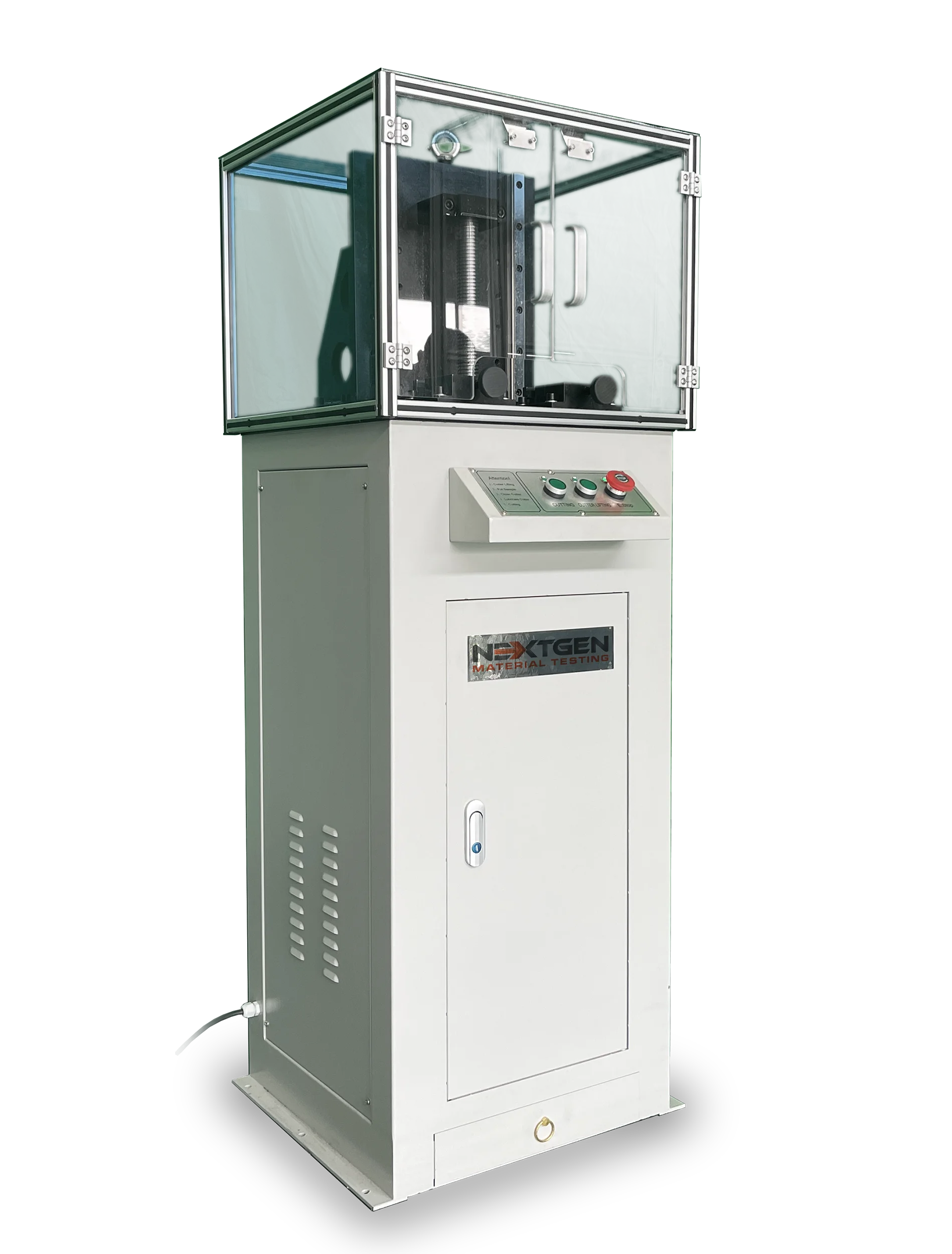
Specimen Notching/Broaching Machine
NextGen offers an economical solution for Specimen notching and broaching for Charpy and Izod specimens. This certified system complies with ASTM ISO148, EN10045, ASTM E23, DIN 50115 standards. This automated, motorized solution is capable of preparing two specimens at any one given time up to 46 HRC. A variety of broaches are available for different geometries of notches.
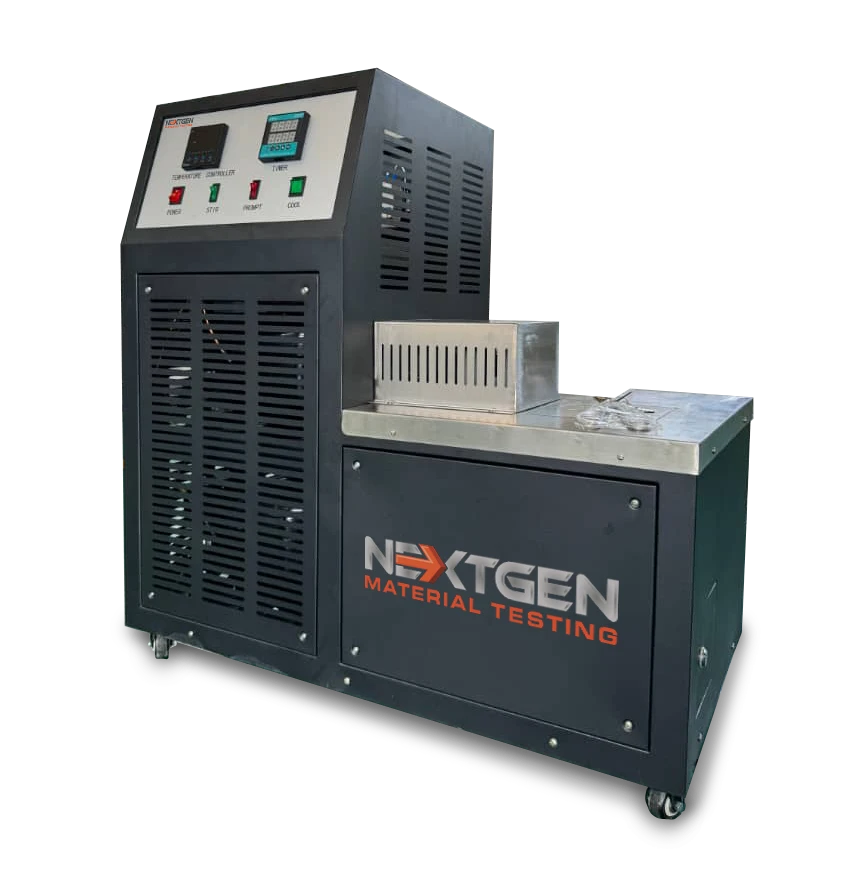
Impact Specimen Cooling and Heating Temperature Chamber
NextGen offers a full range of impact specimen cooling and heating chamber designed to meet virtually all Charpy, Izod and Tensile Impact Testing requirements. NextGen's temperature chambers are a combination of user-friendliness, compact and robust build, offering the ultimate versatility of cooling and heating requirements.
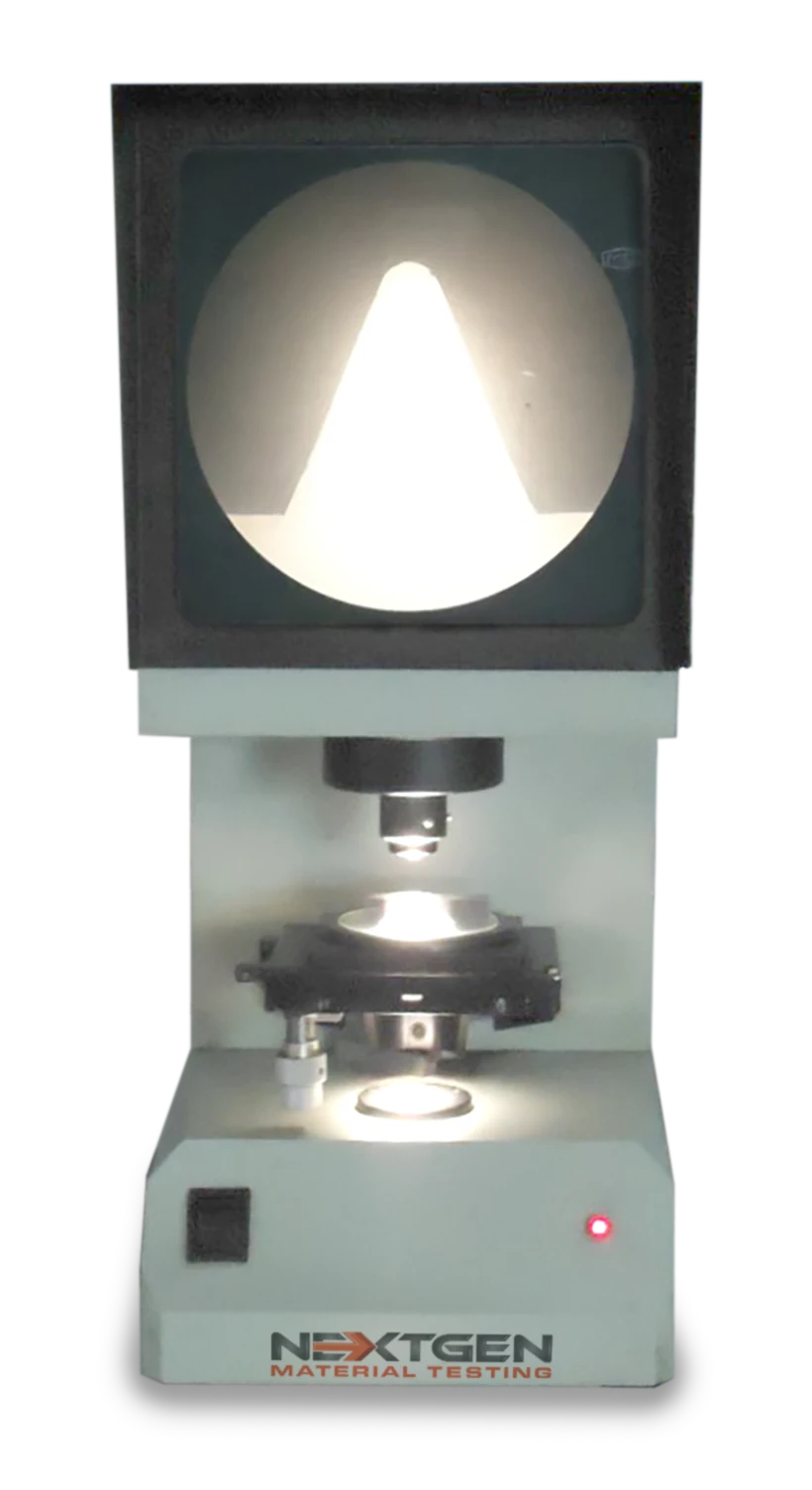
Charpy/Izod Notch Verification Projector System NG-NPS-CIS
Enhance your material testing accuracy with our advanced Charpy/Izod Notch Verification Projector System NG-NPS-CIS.
